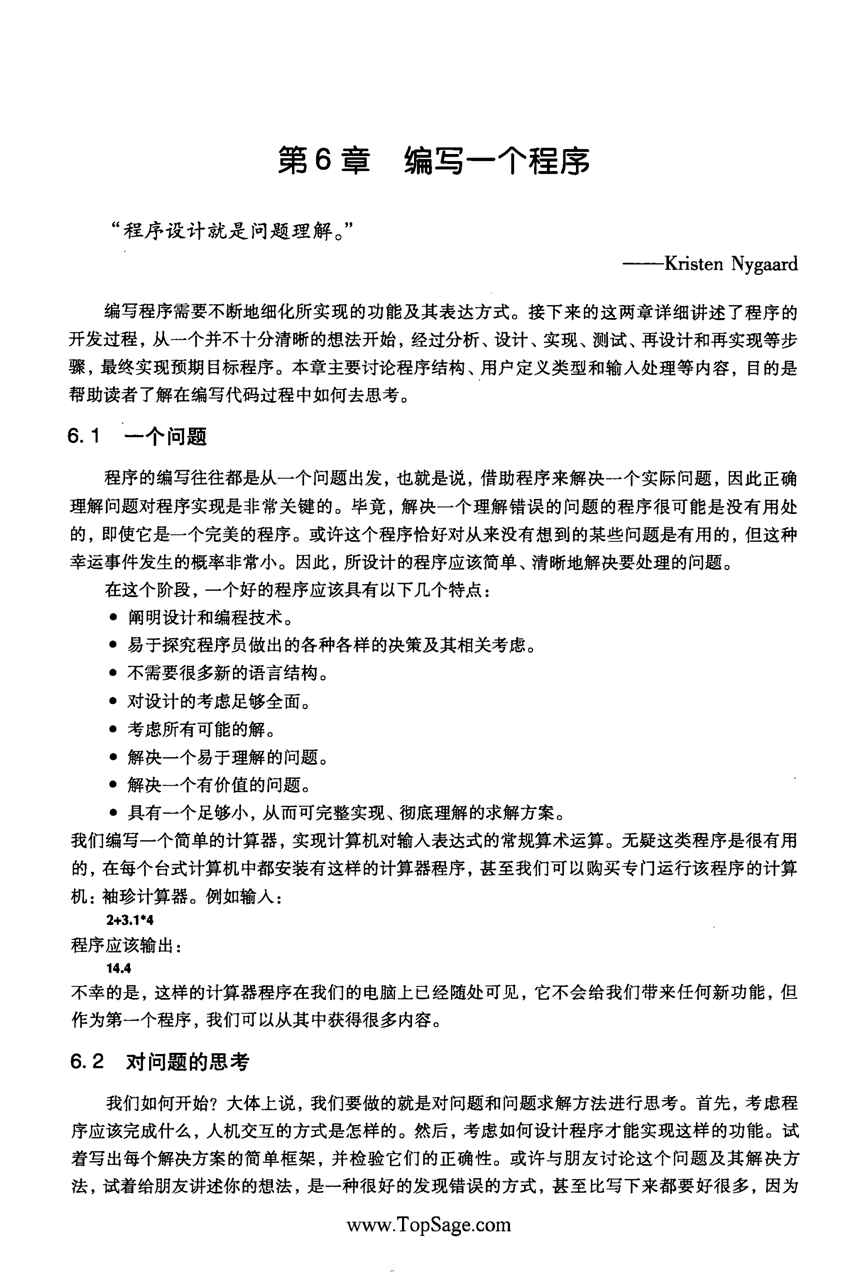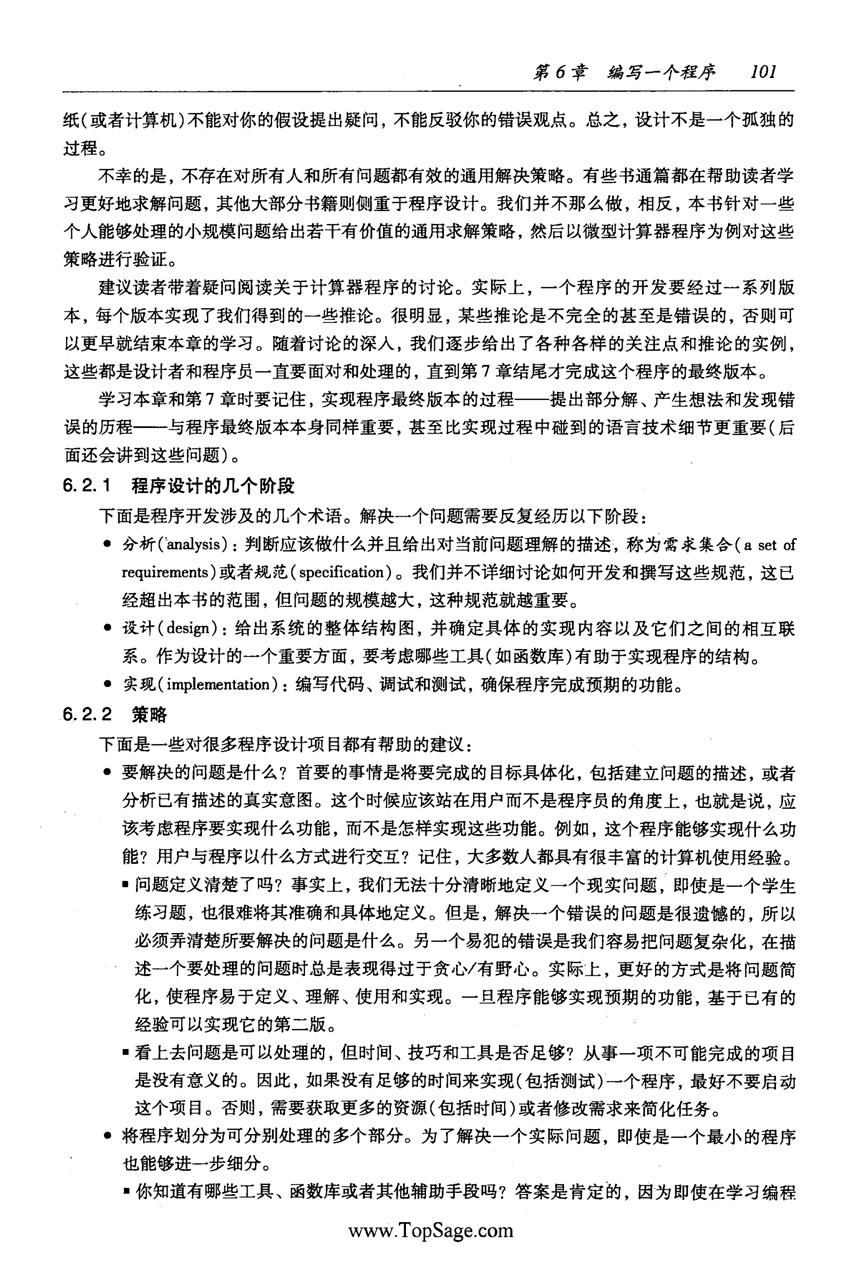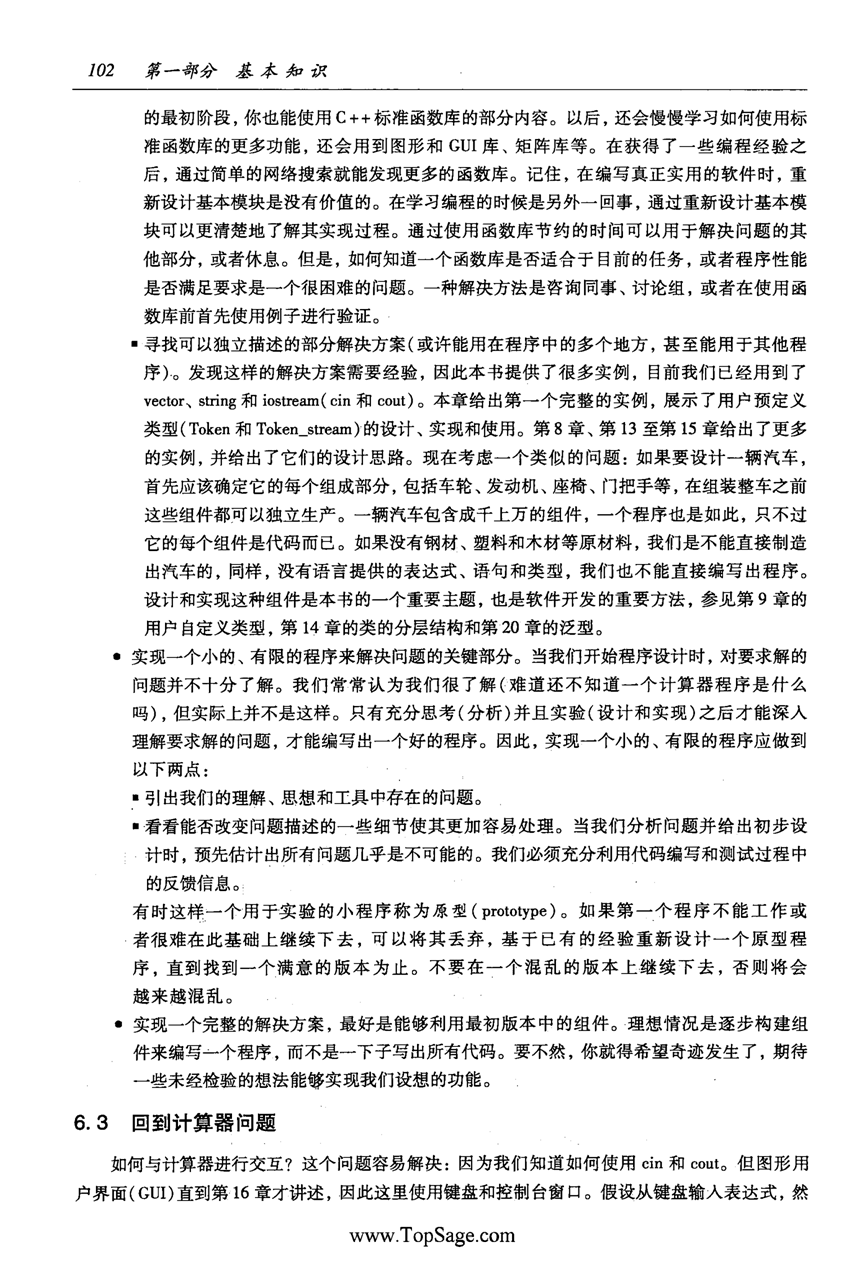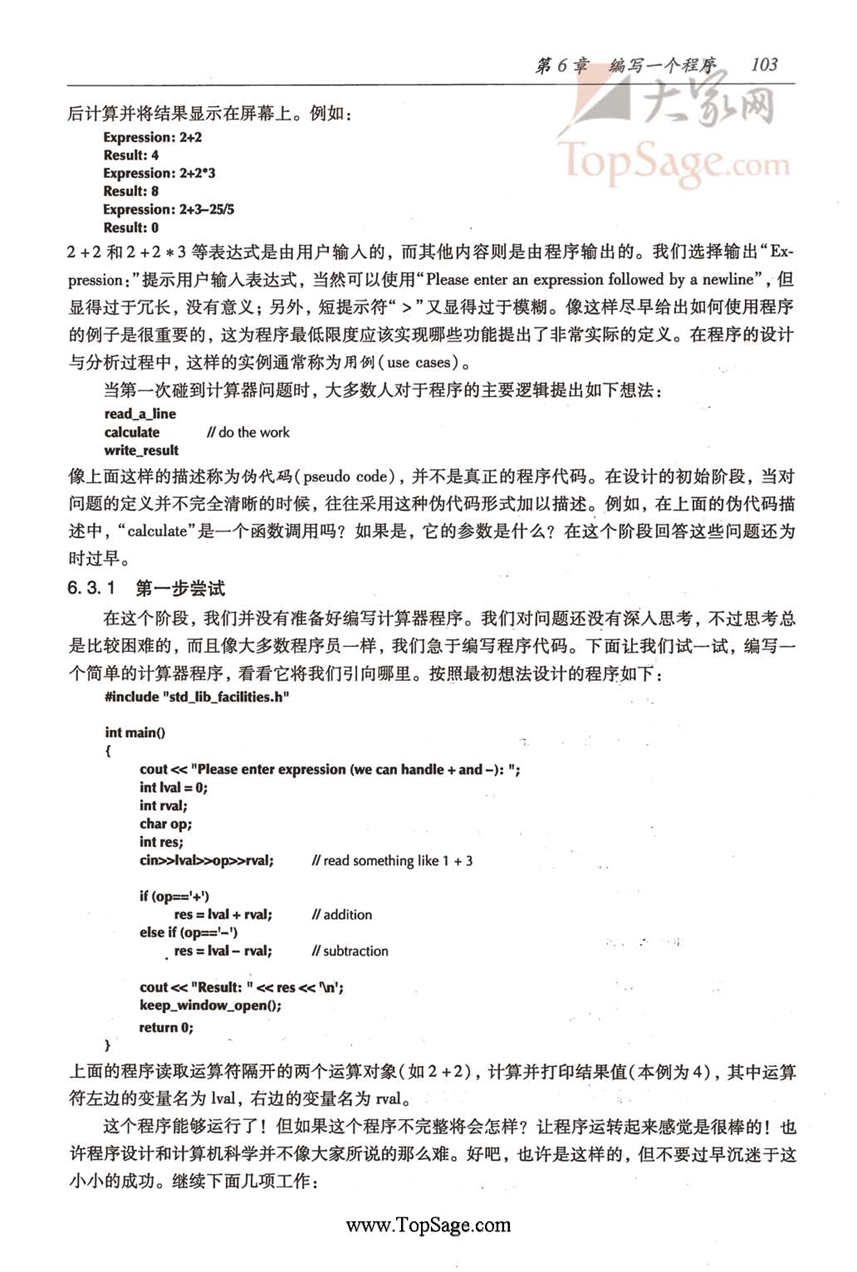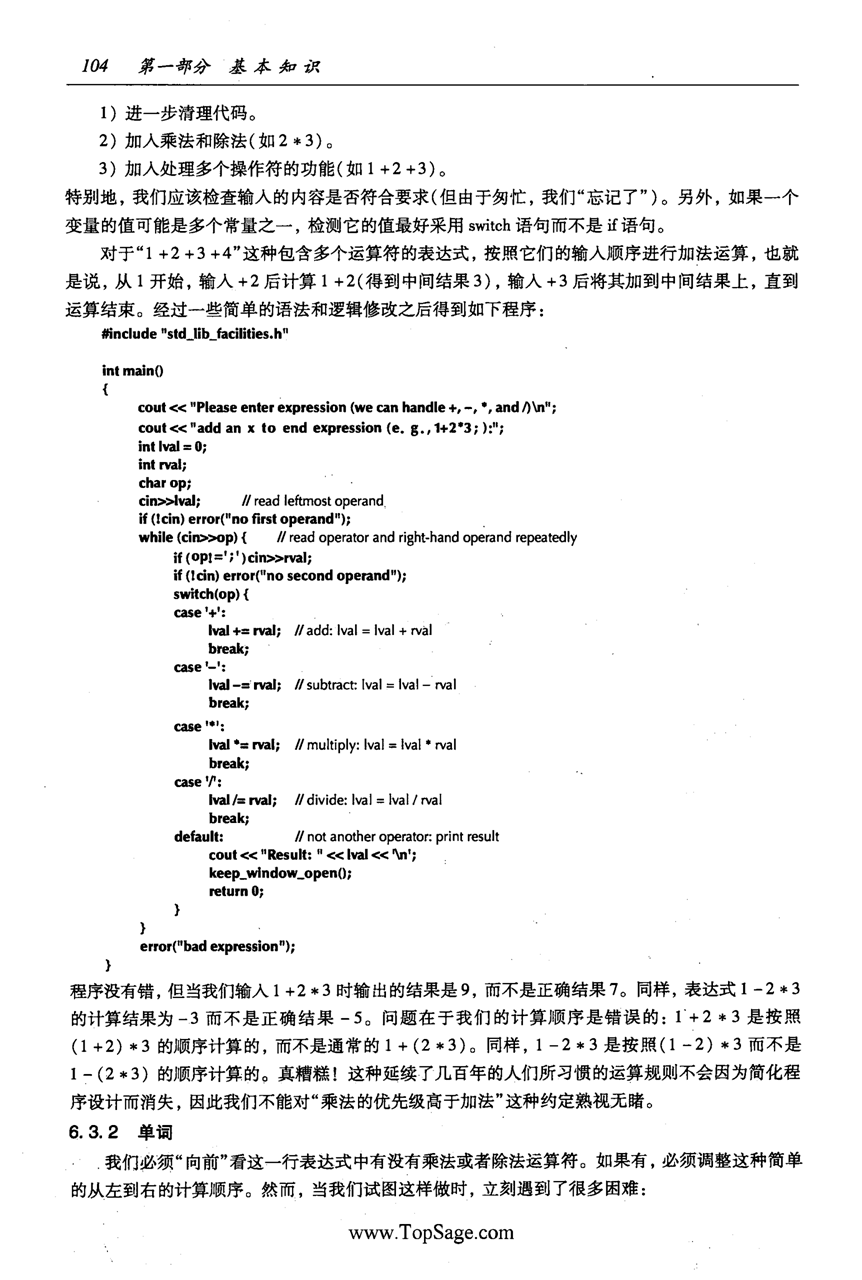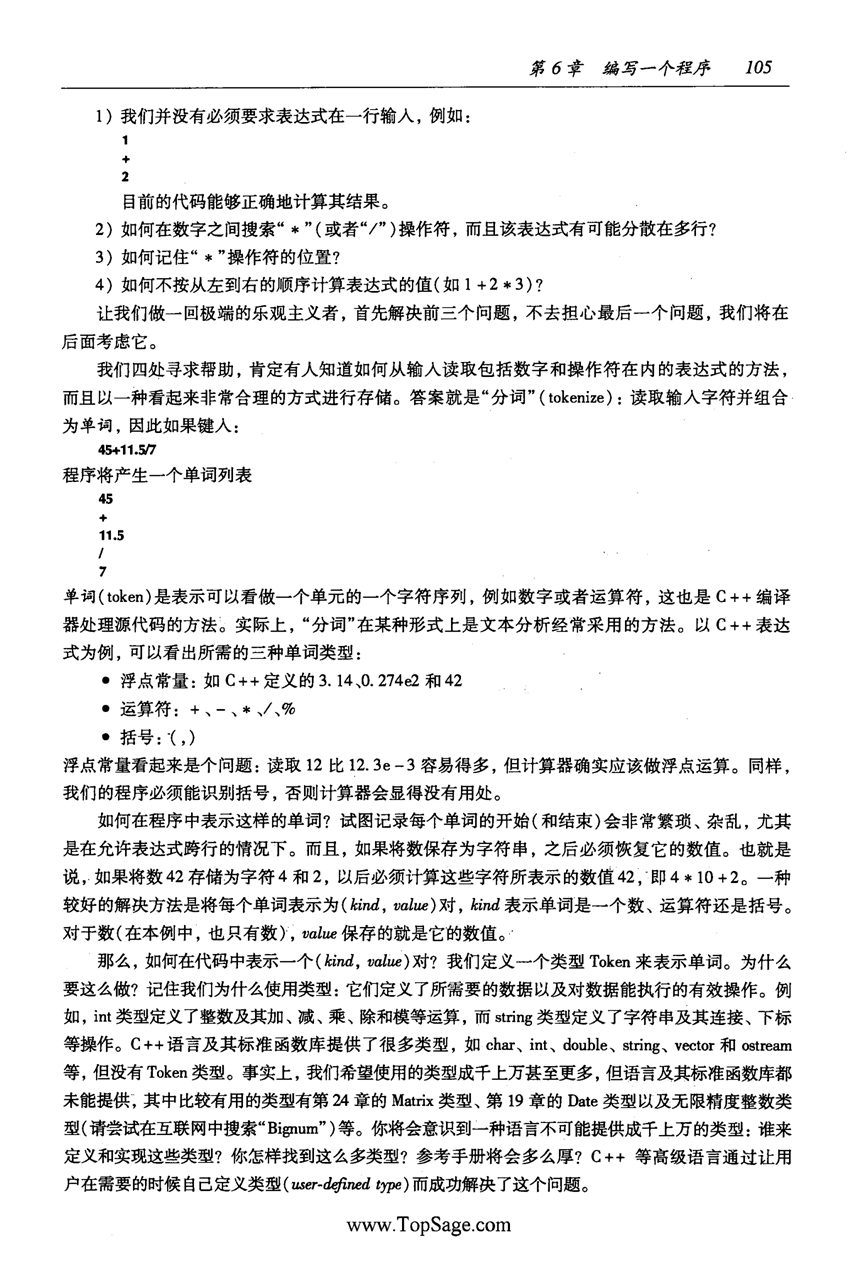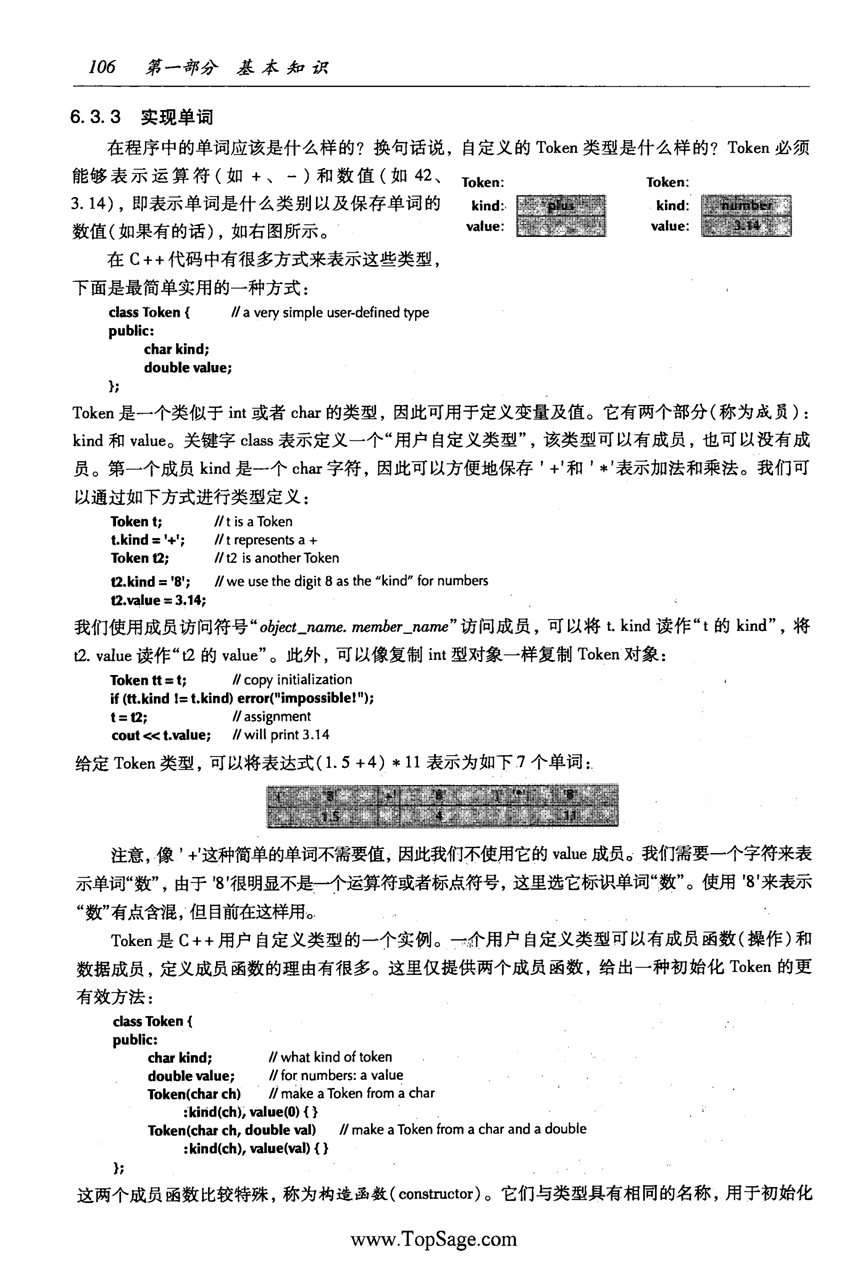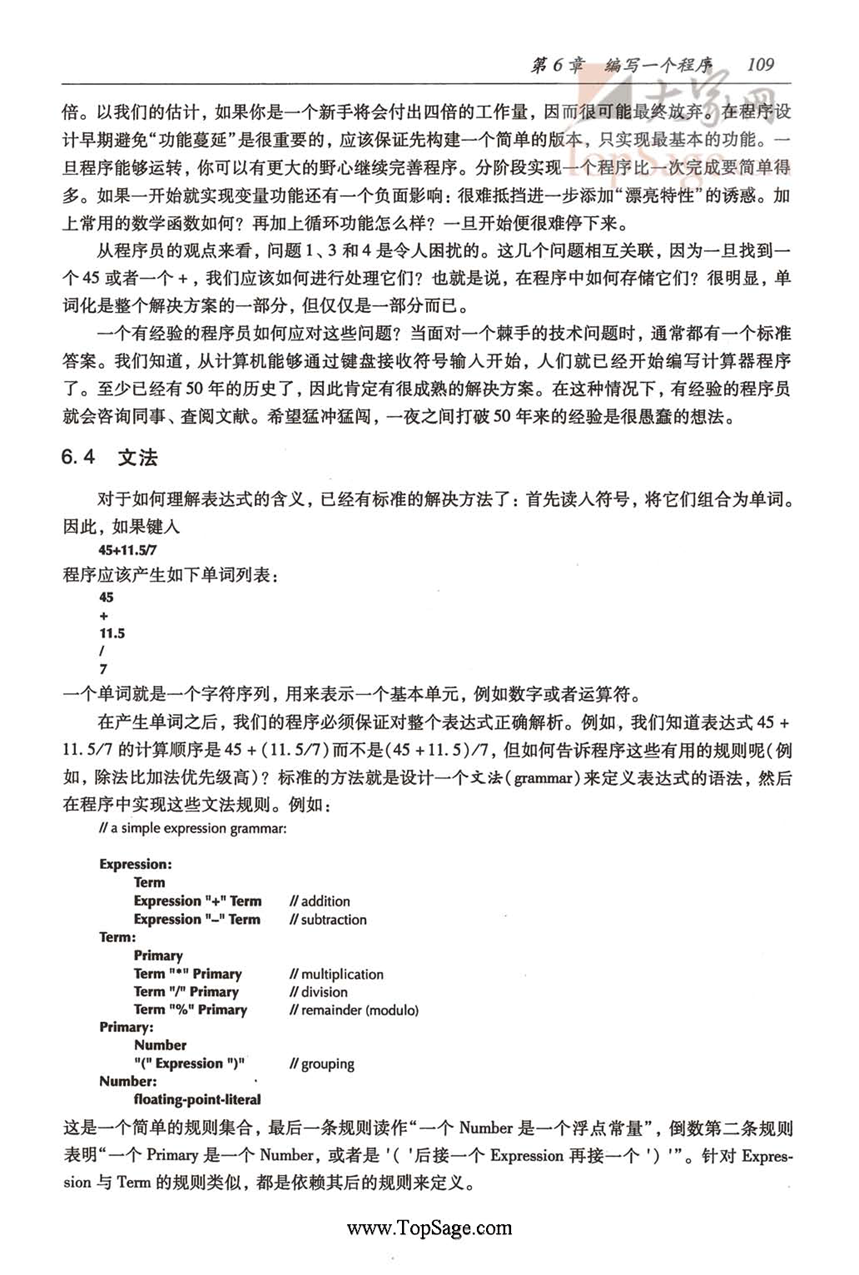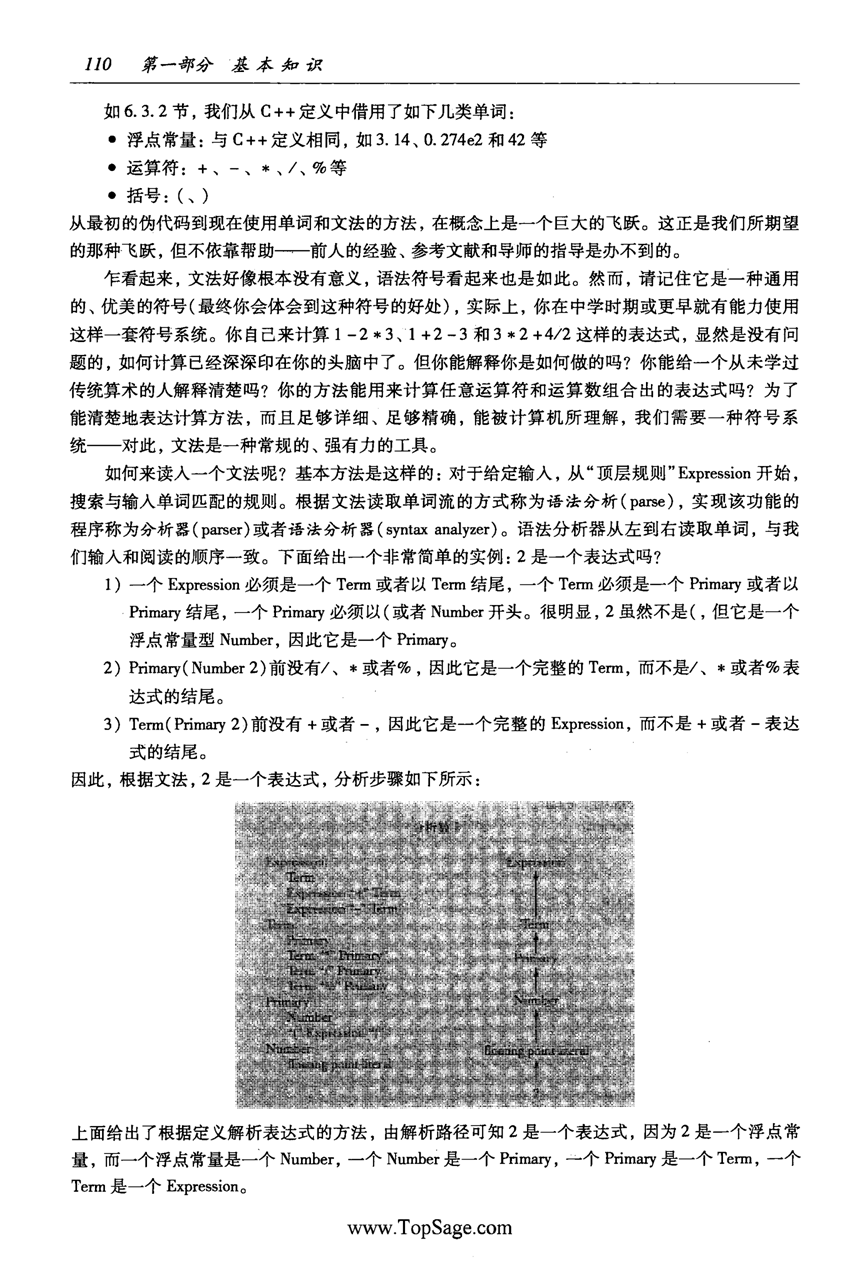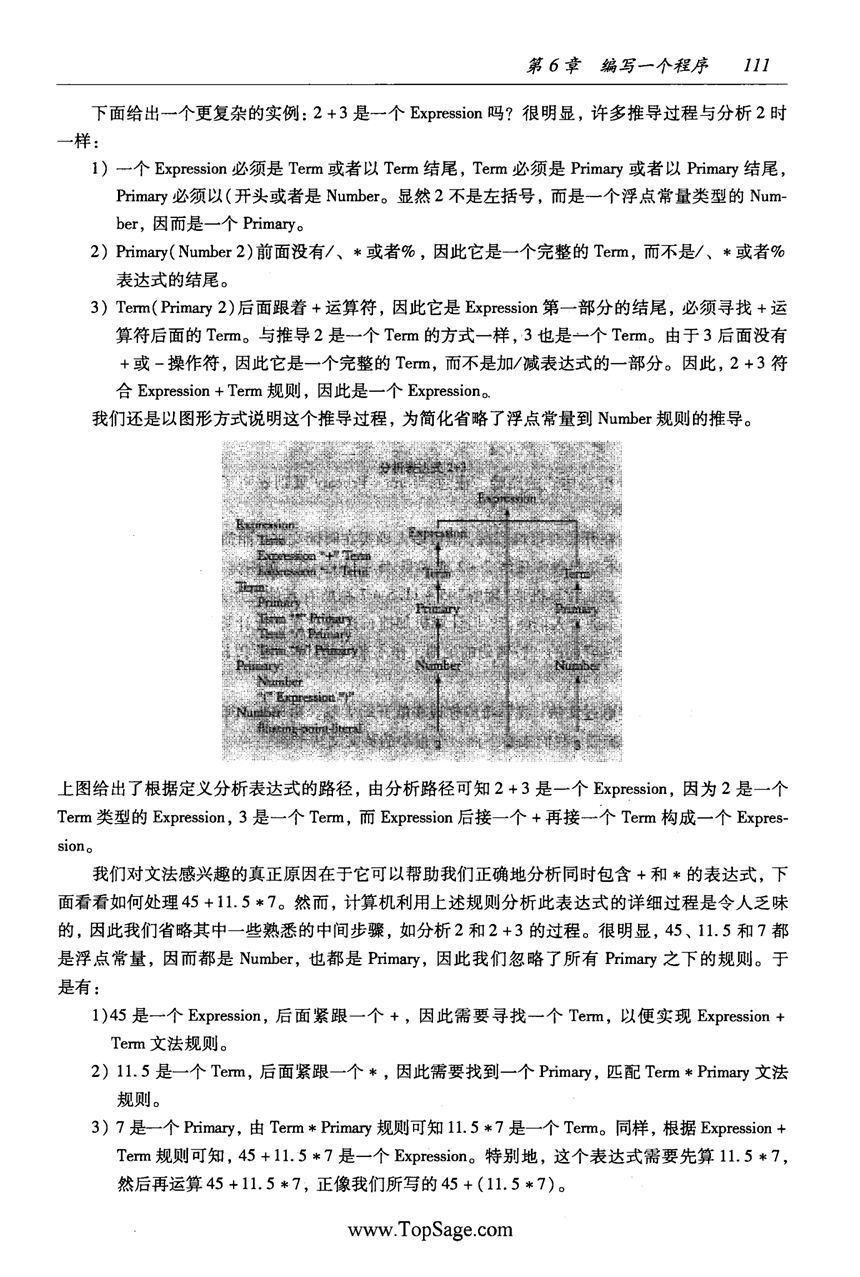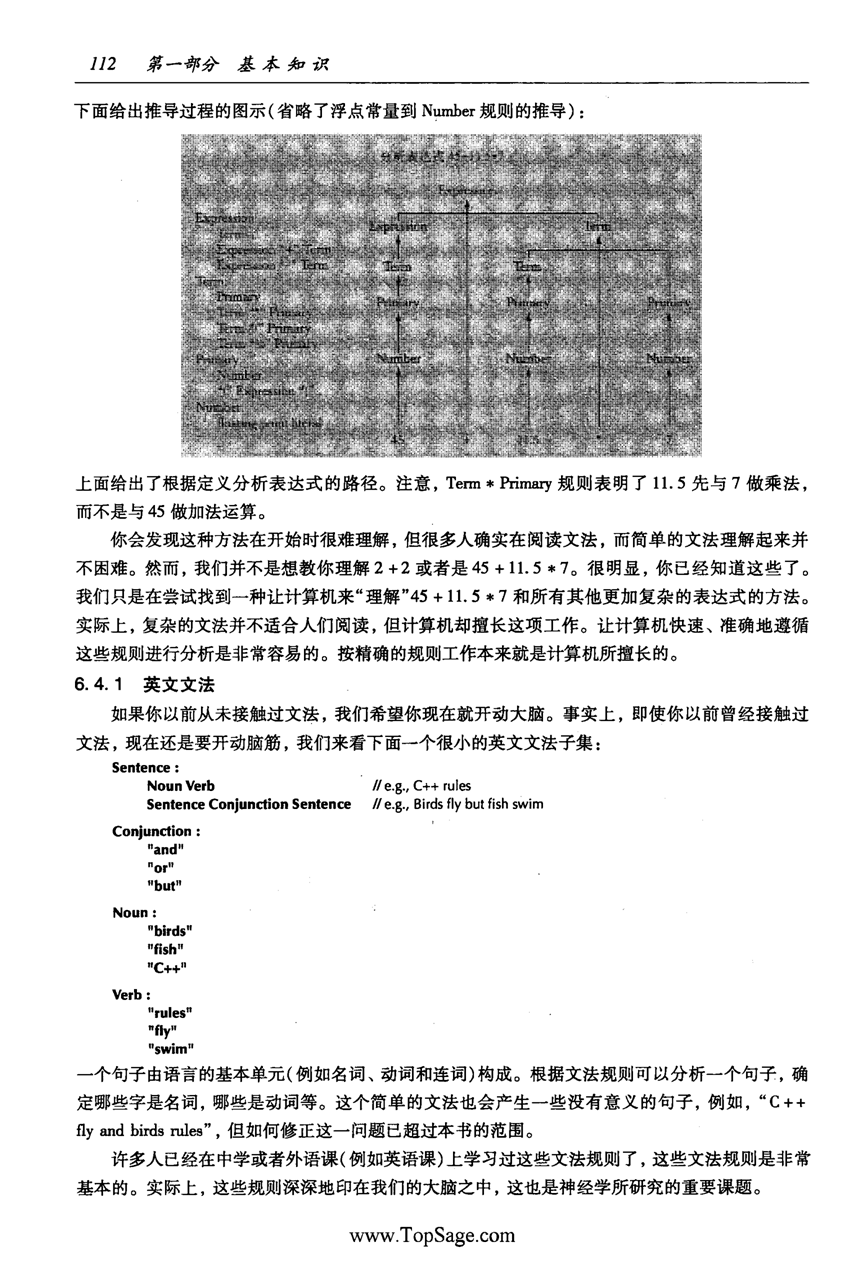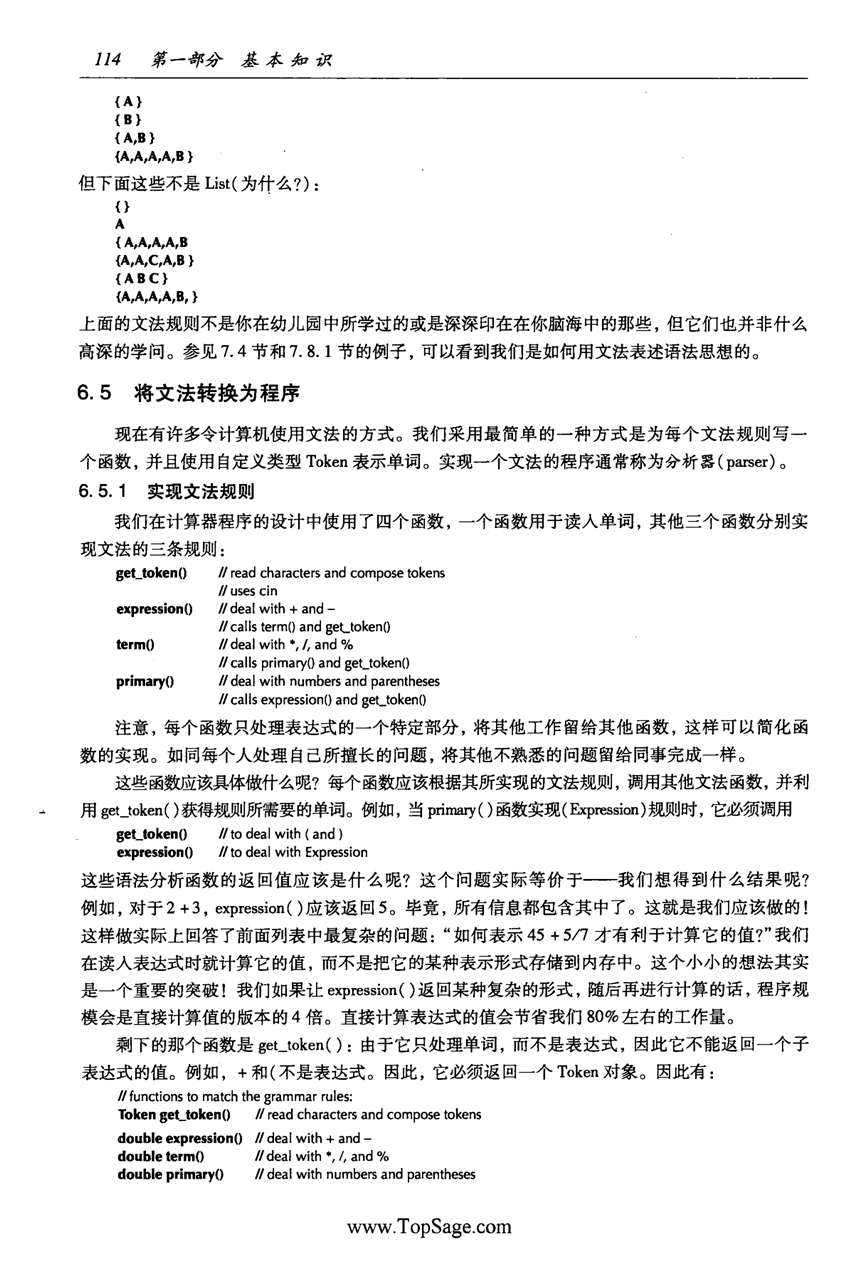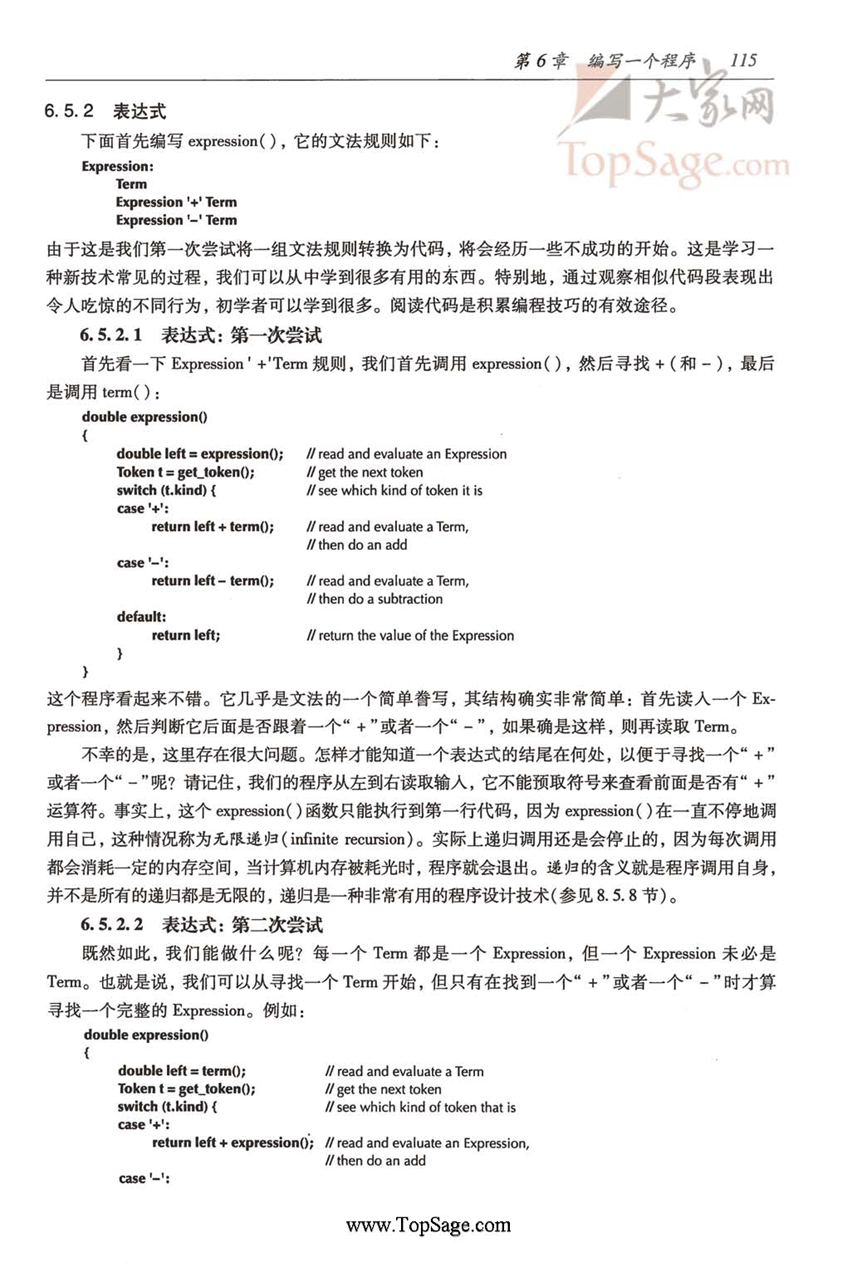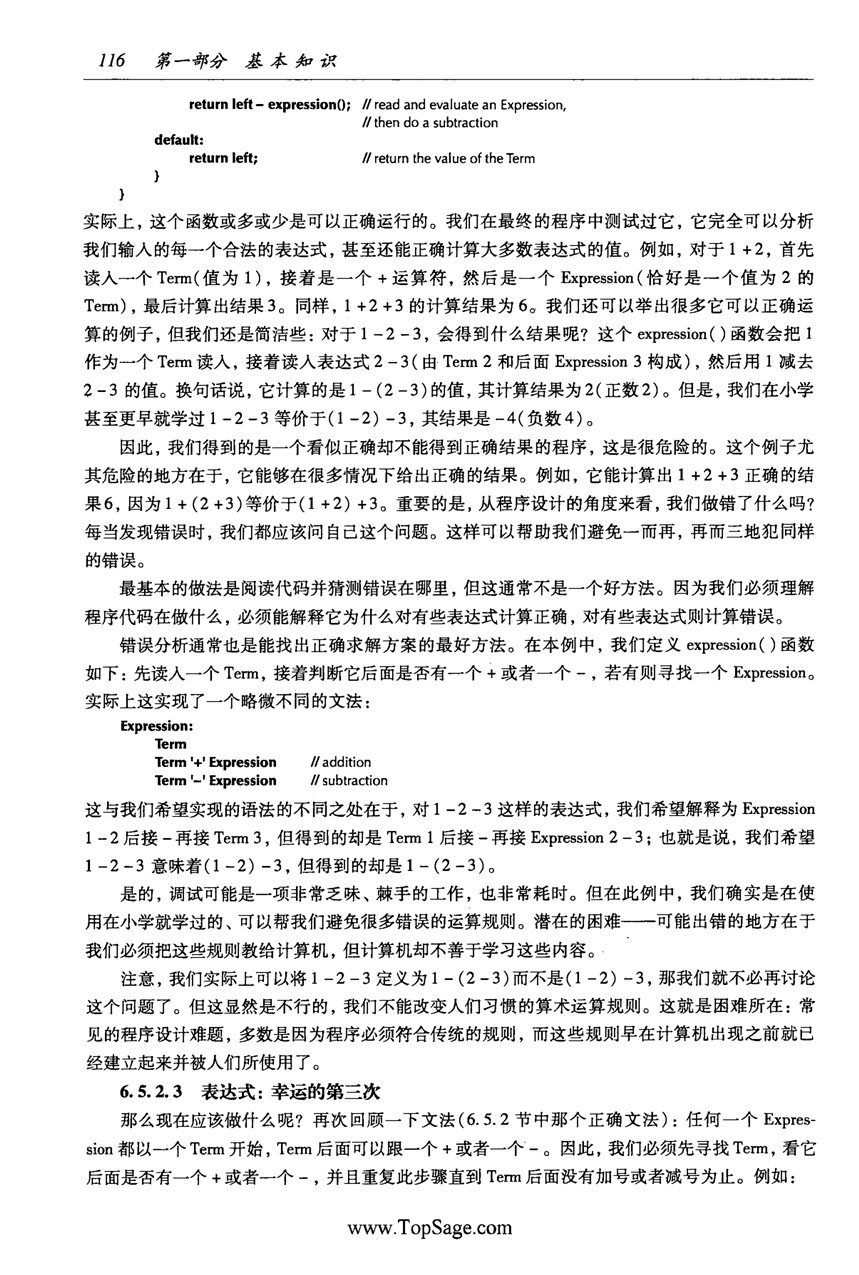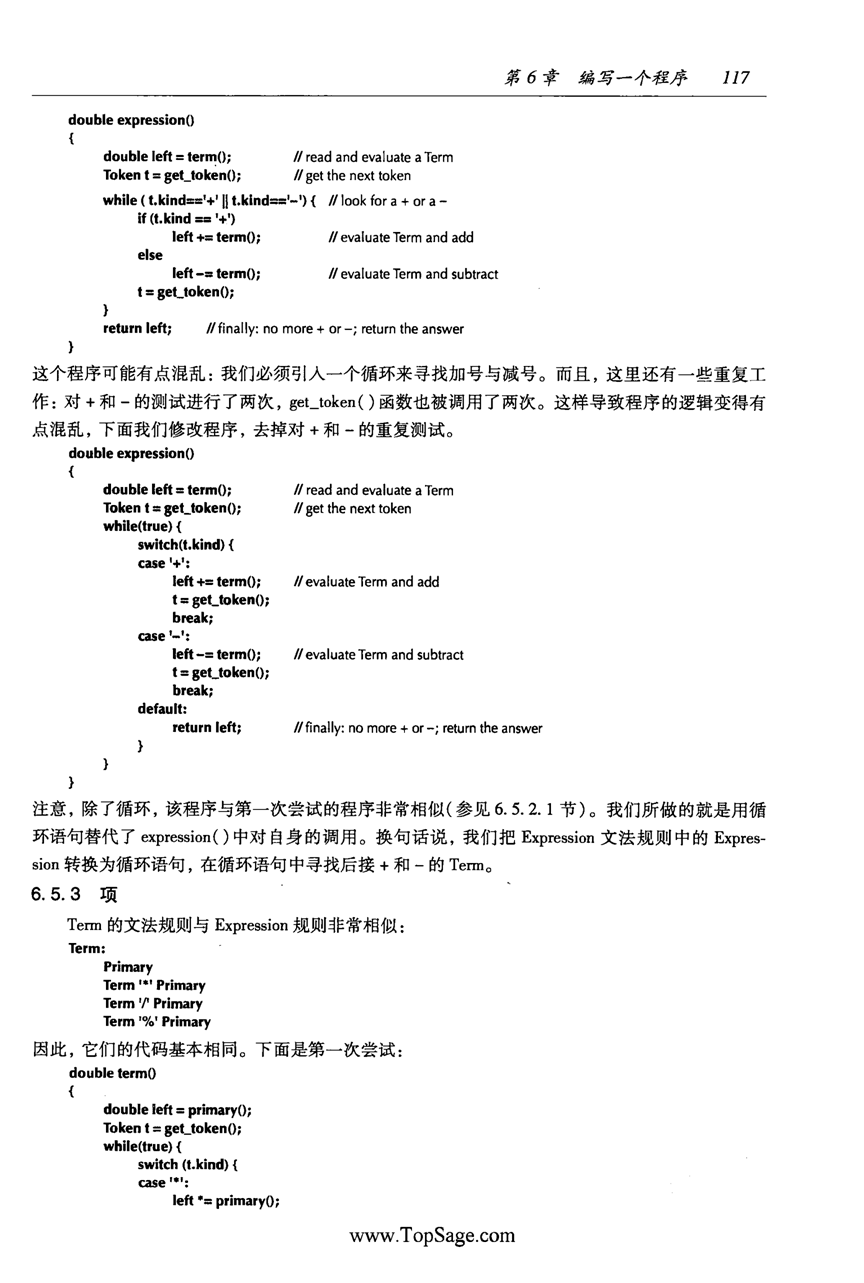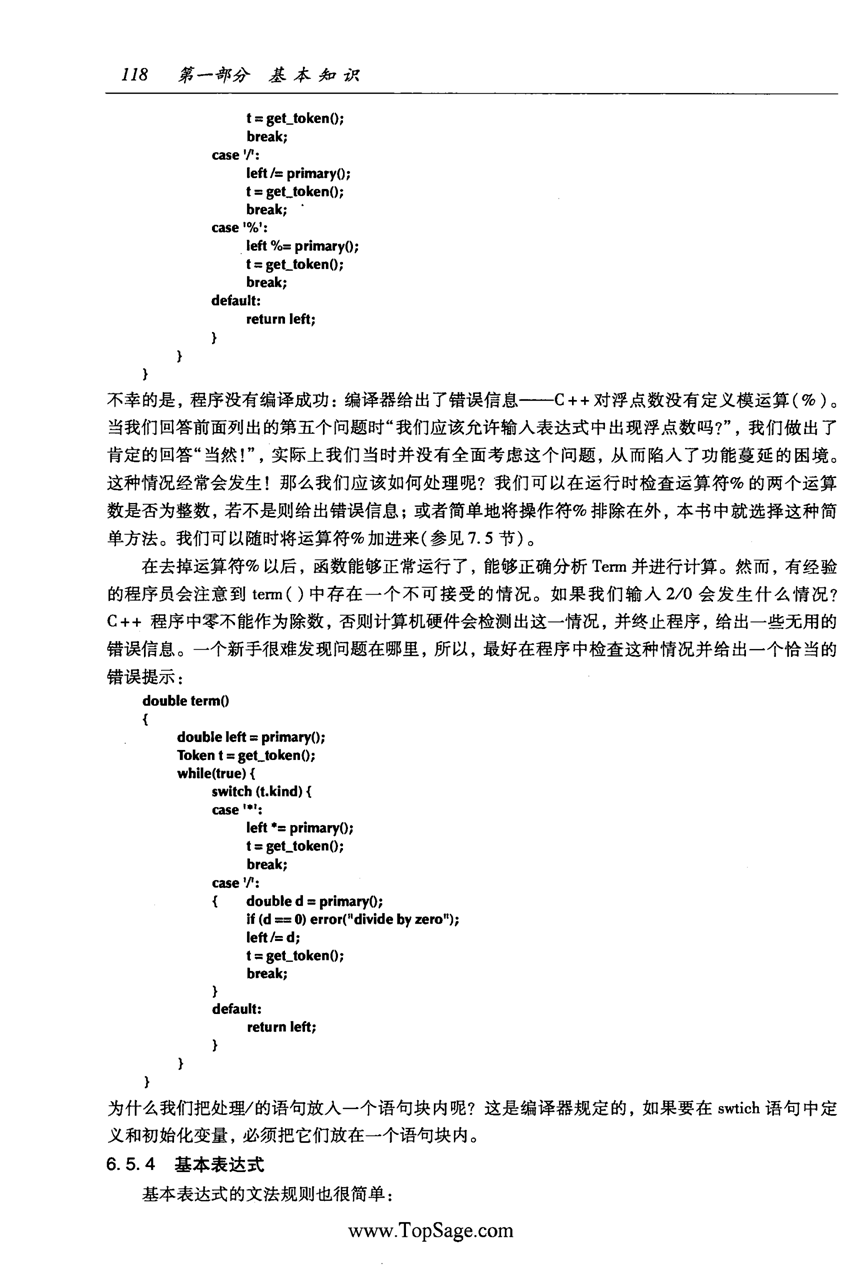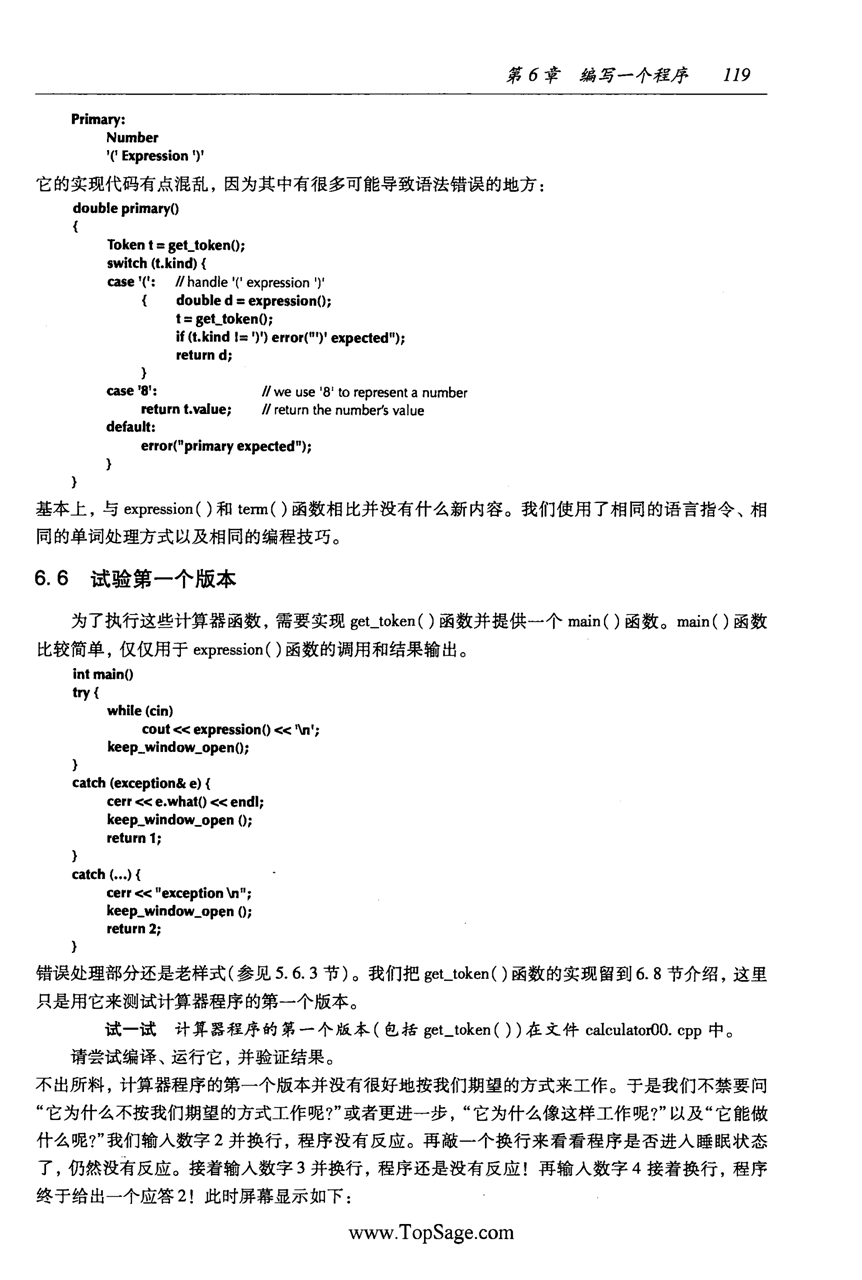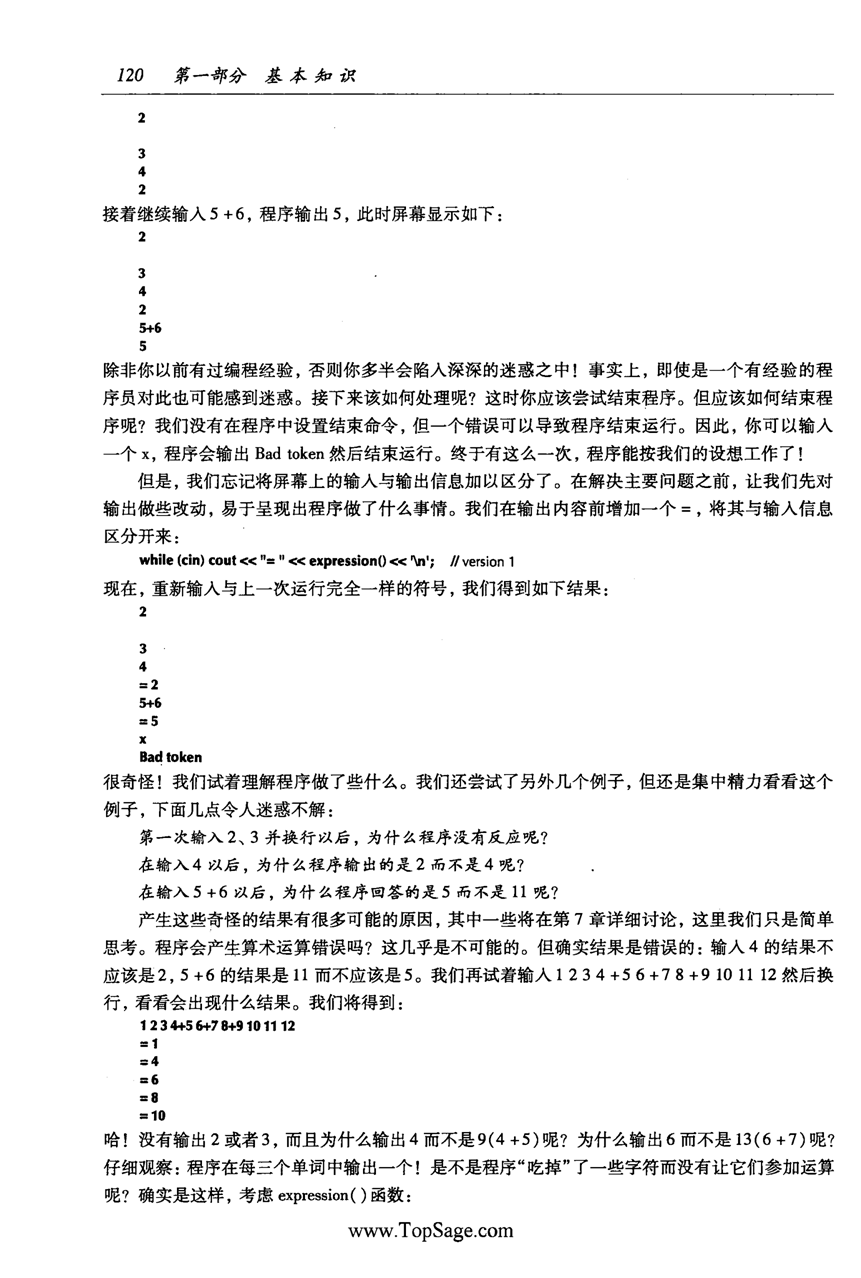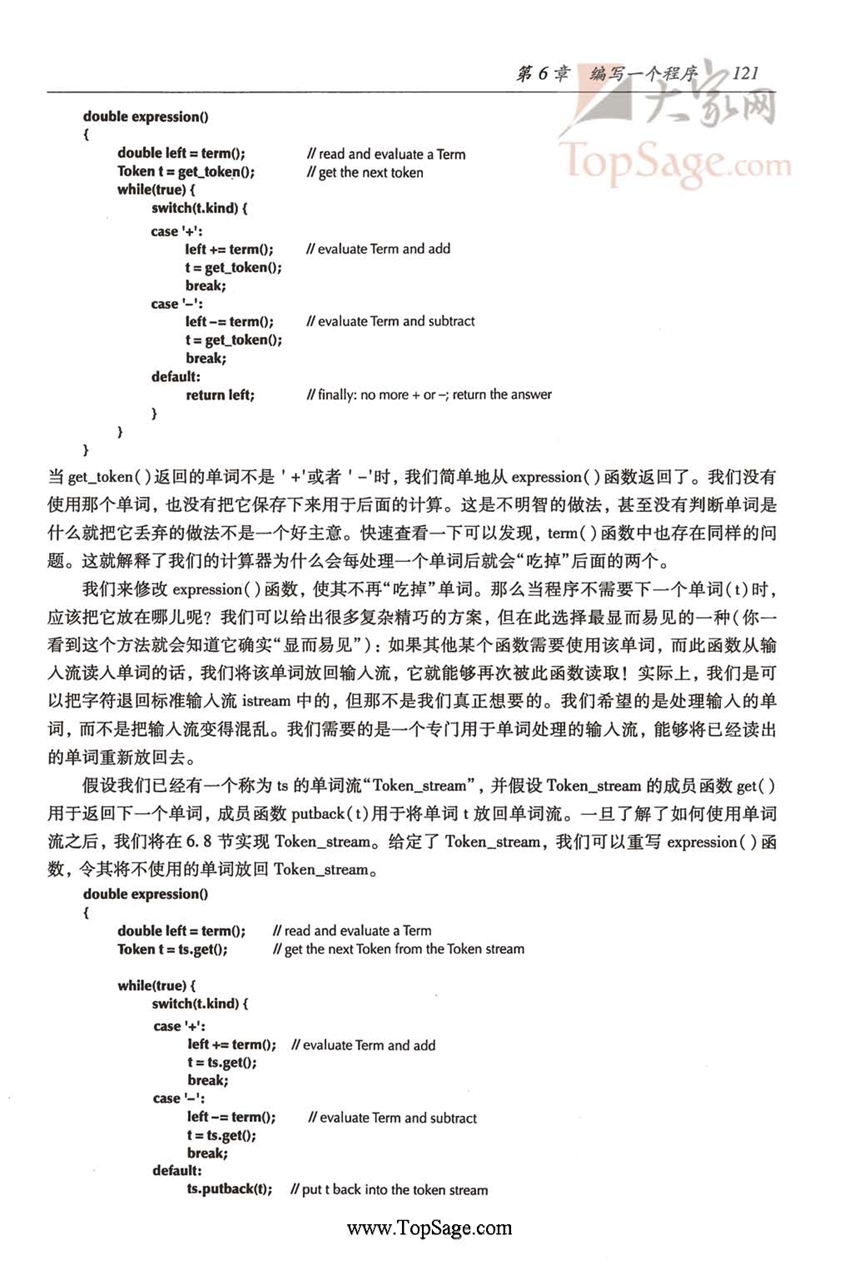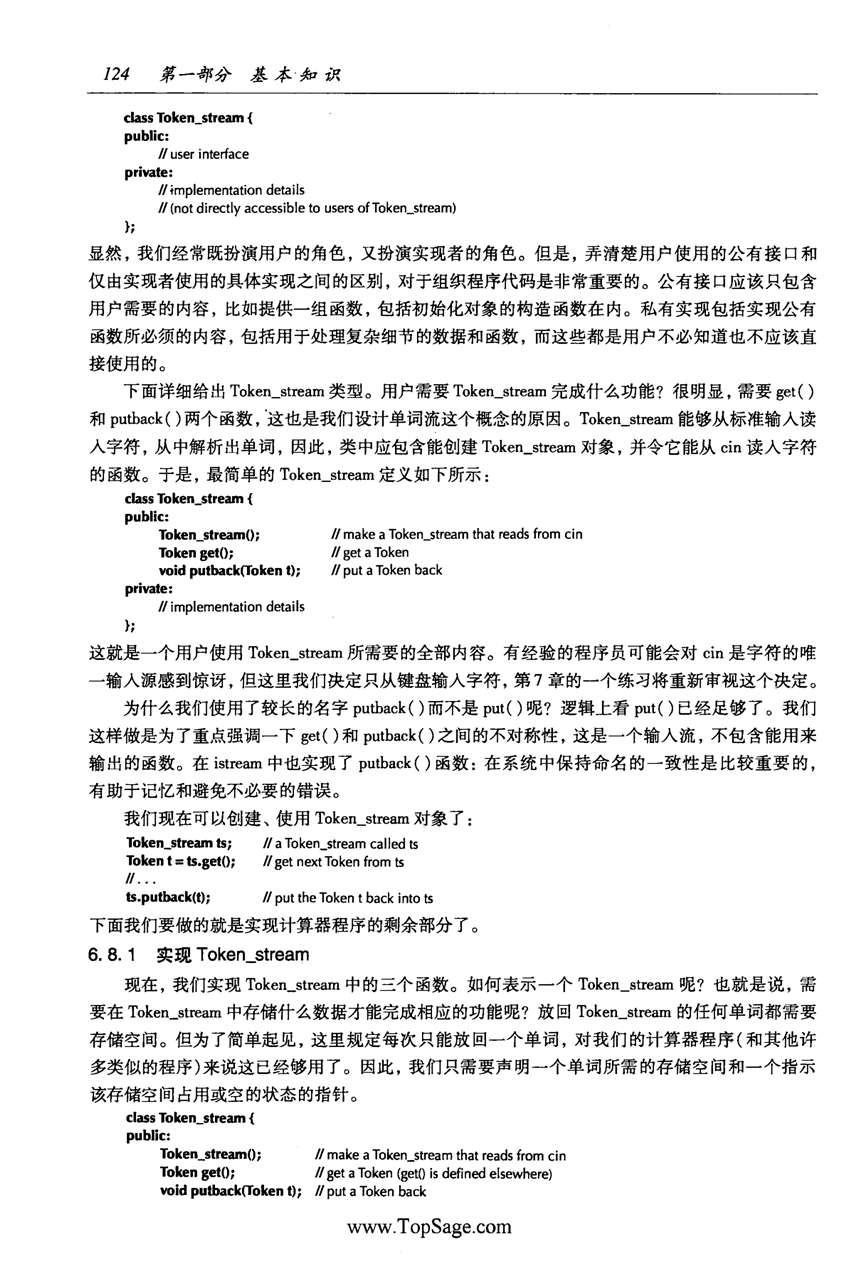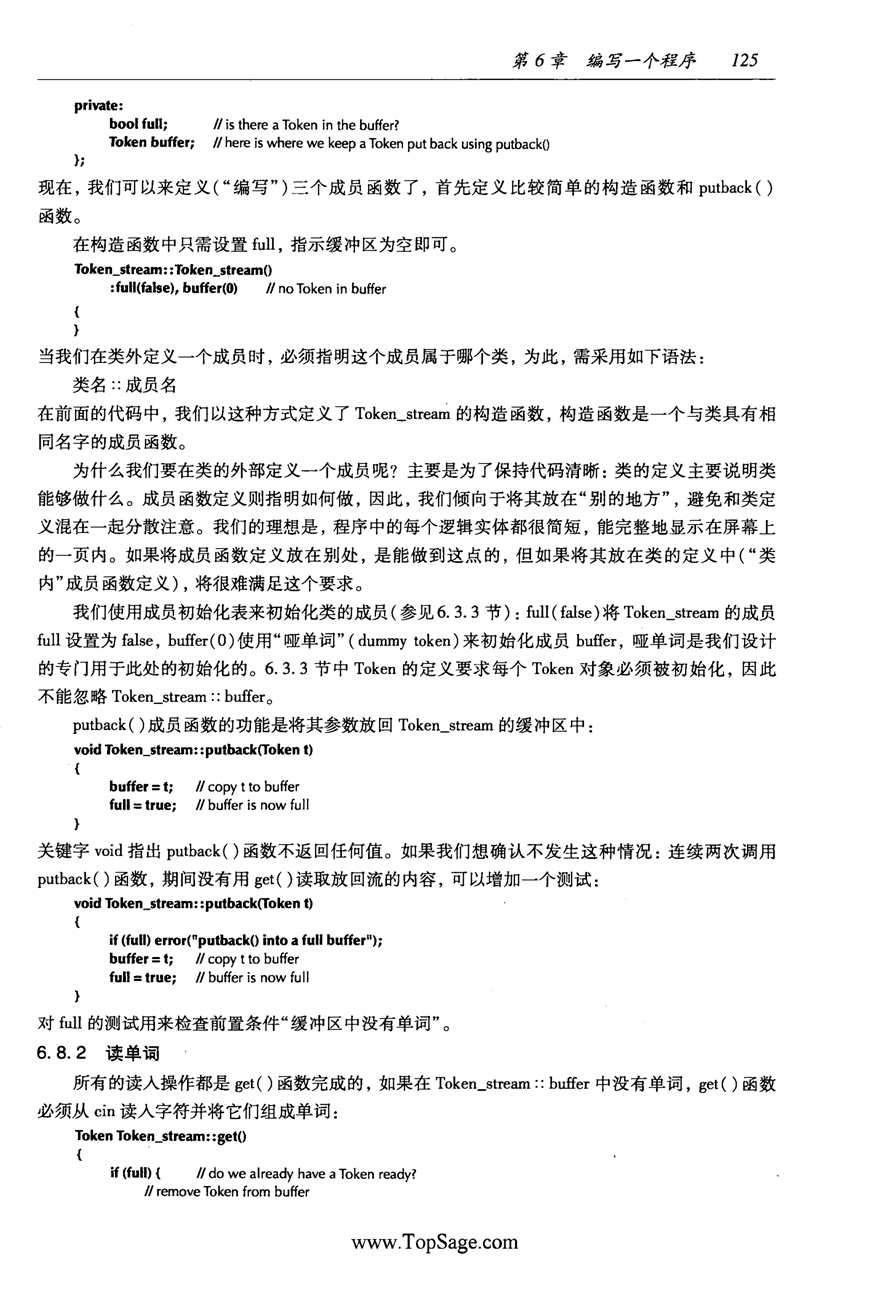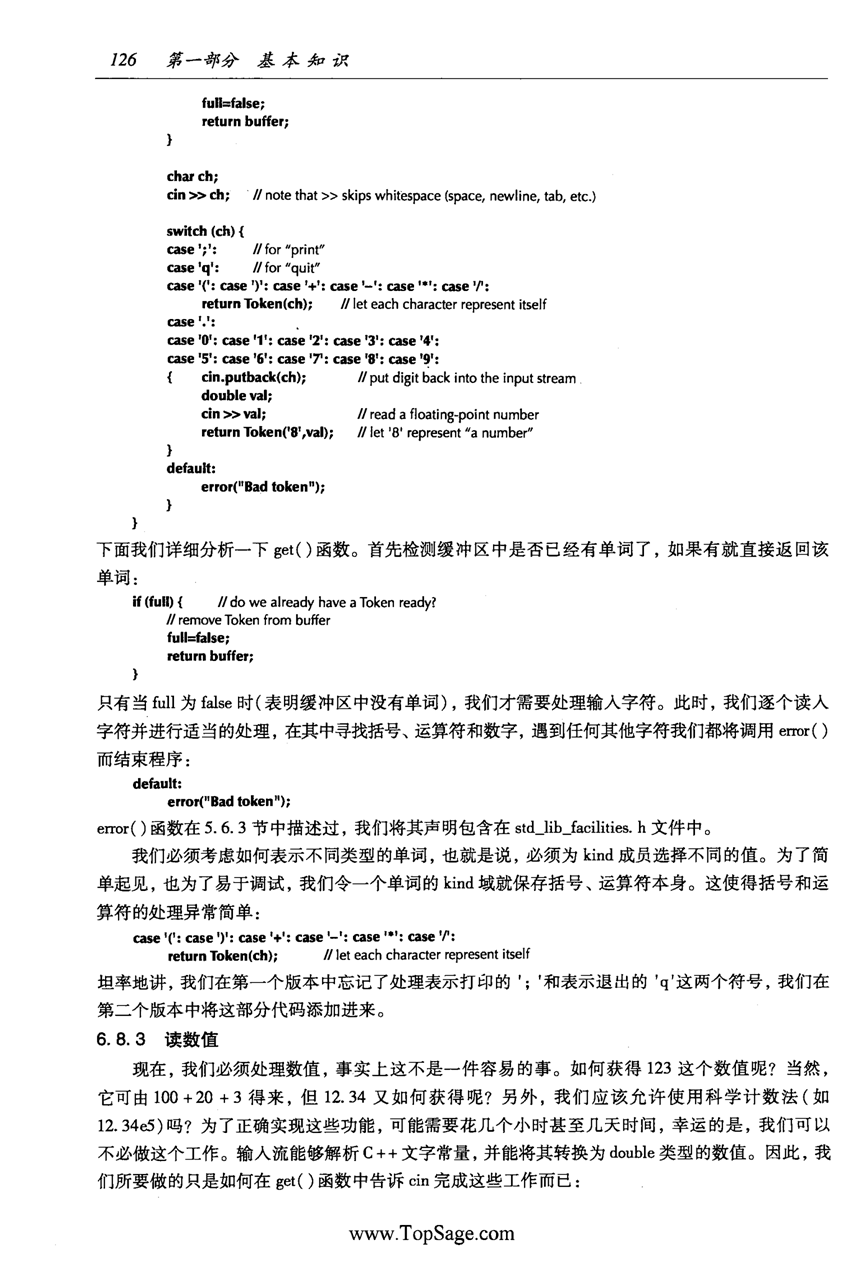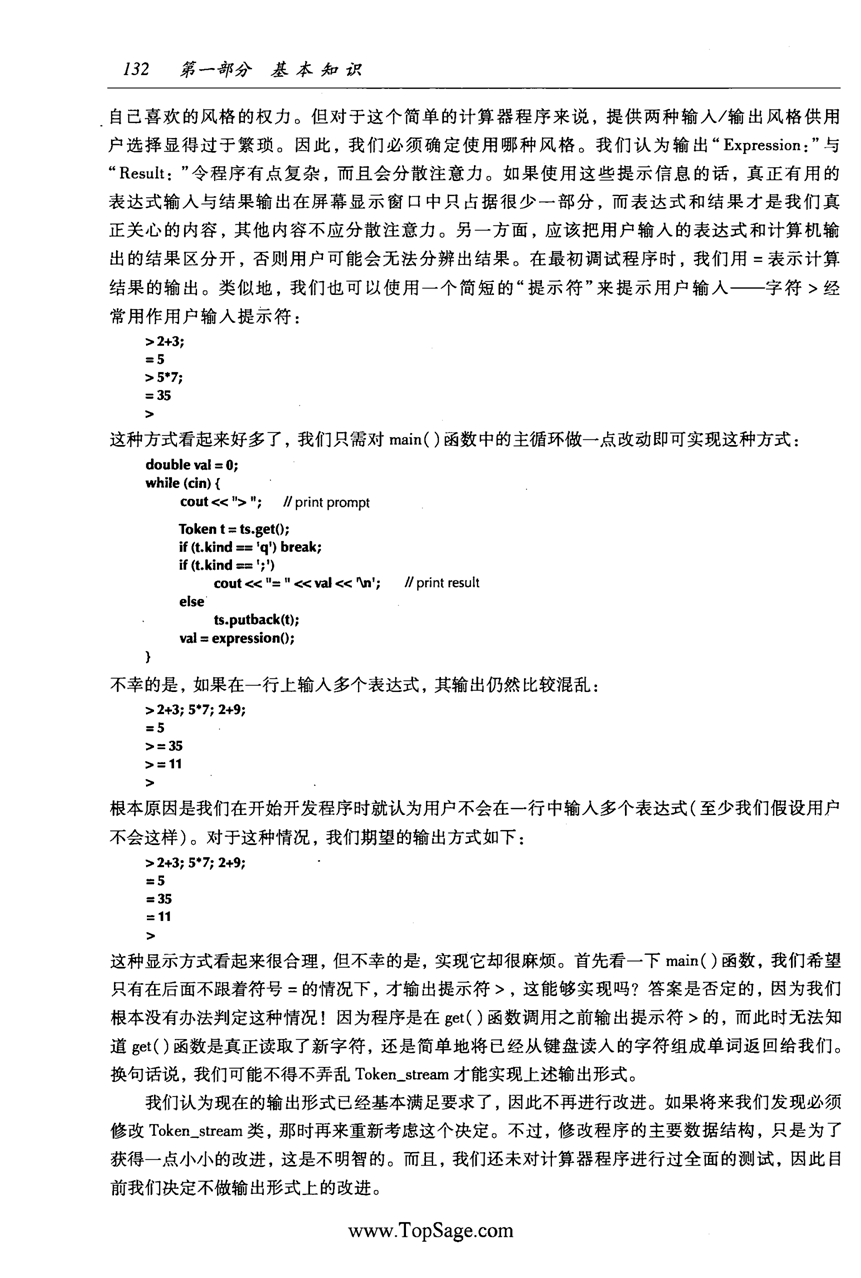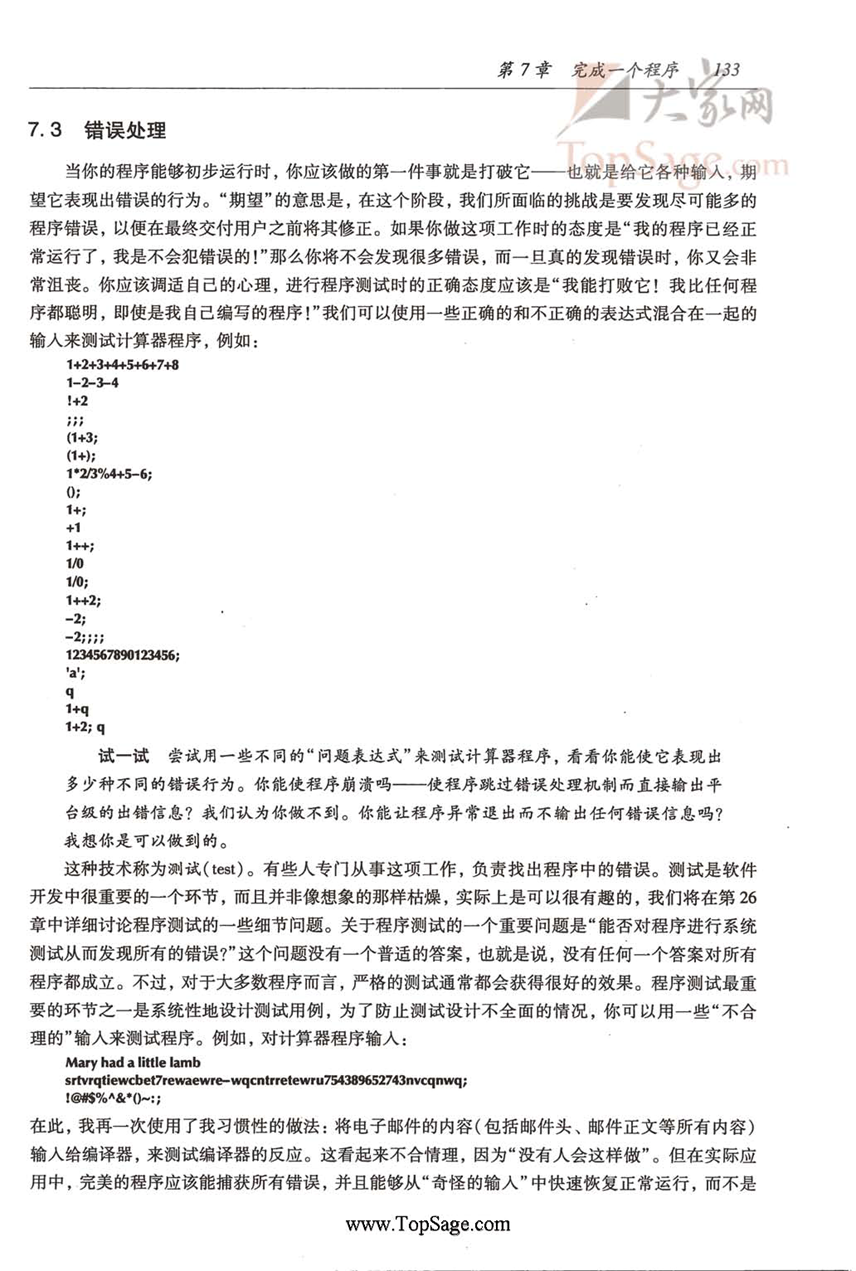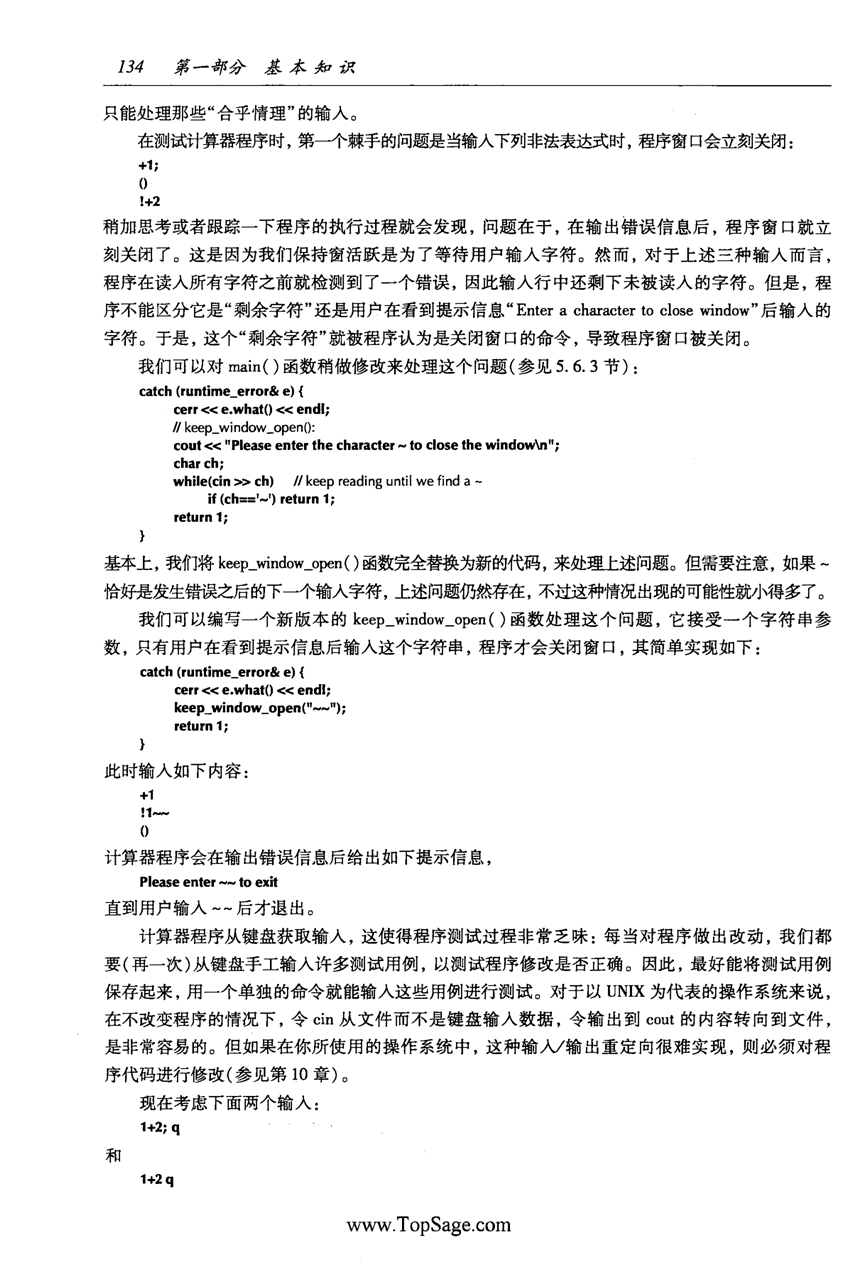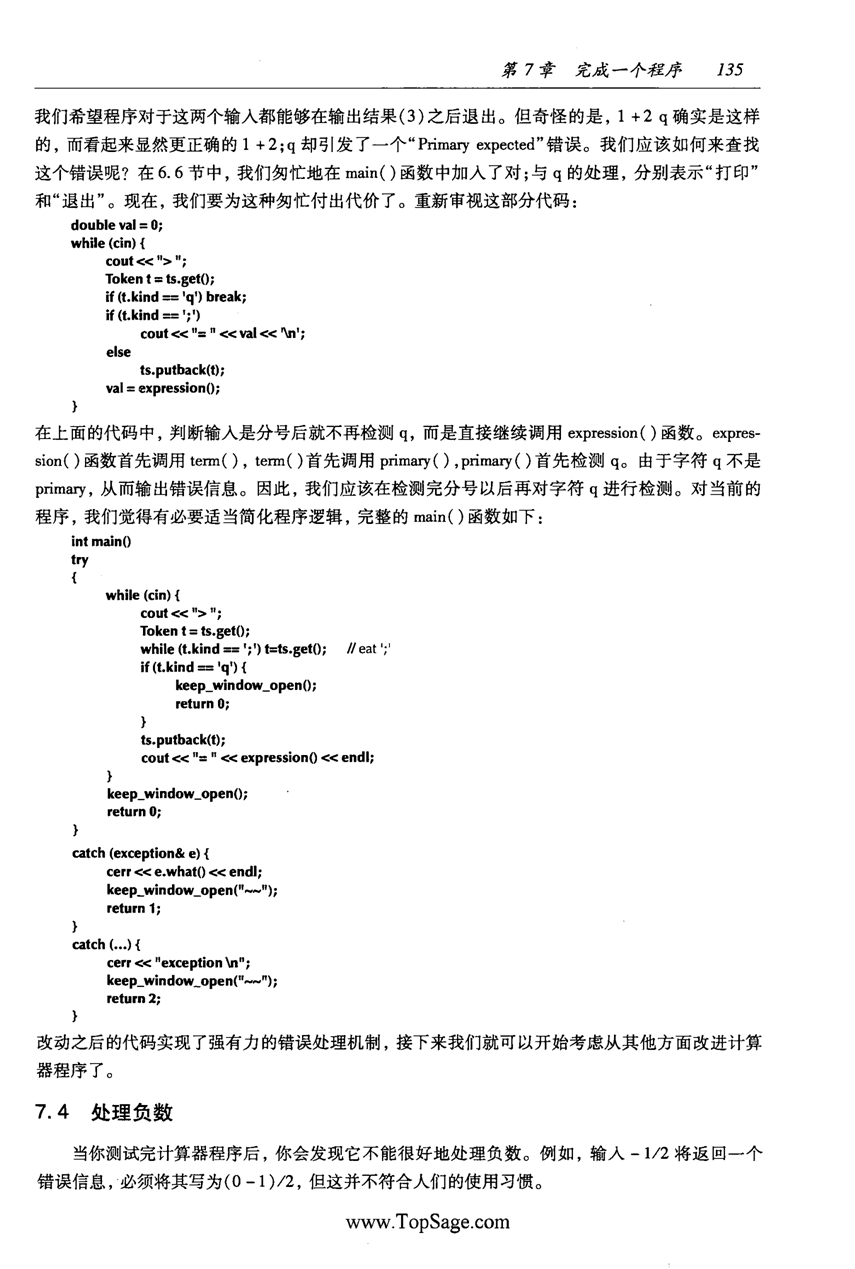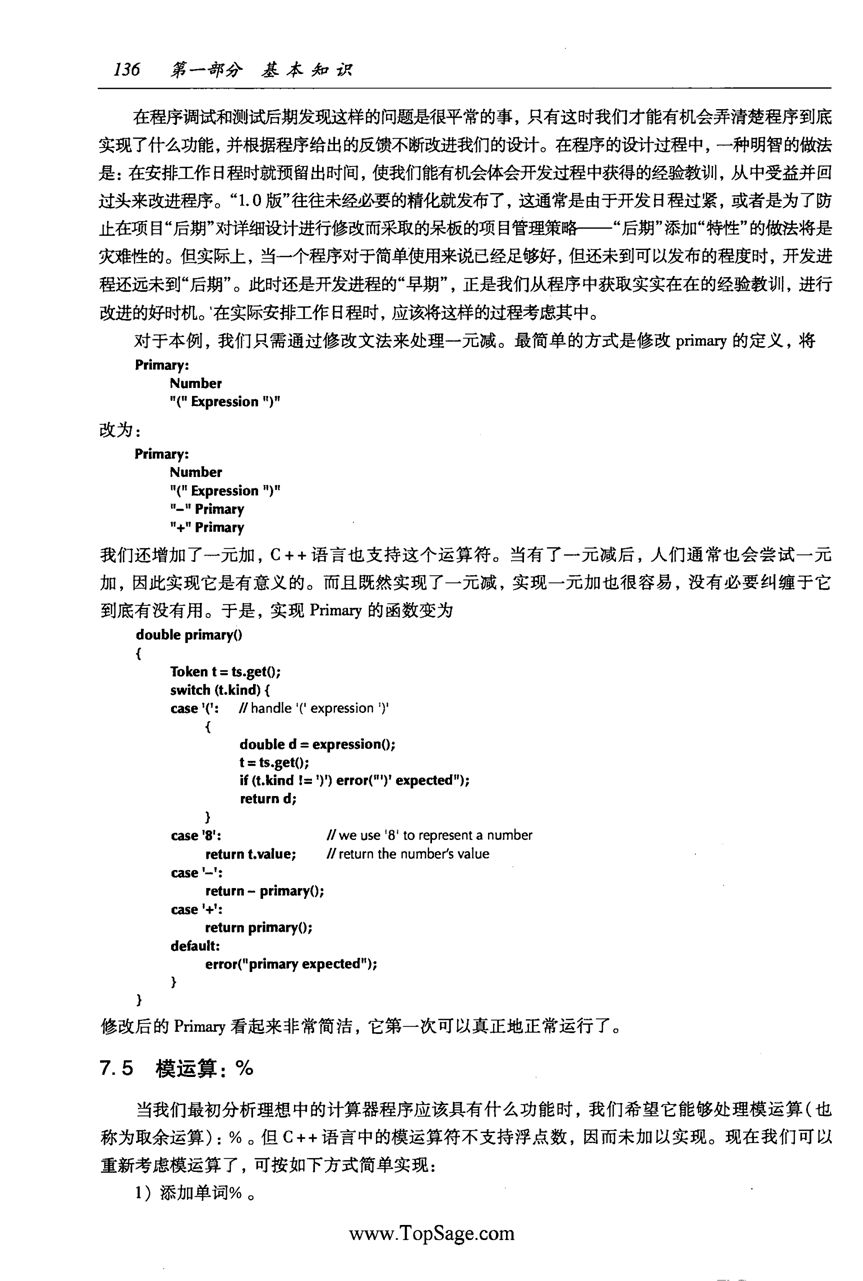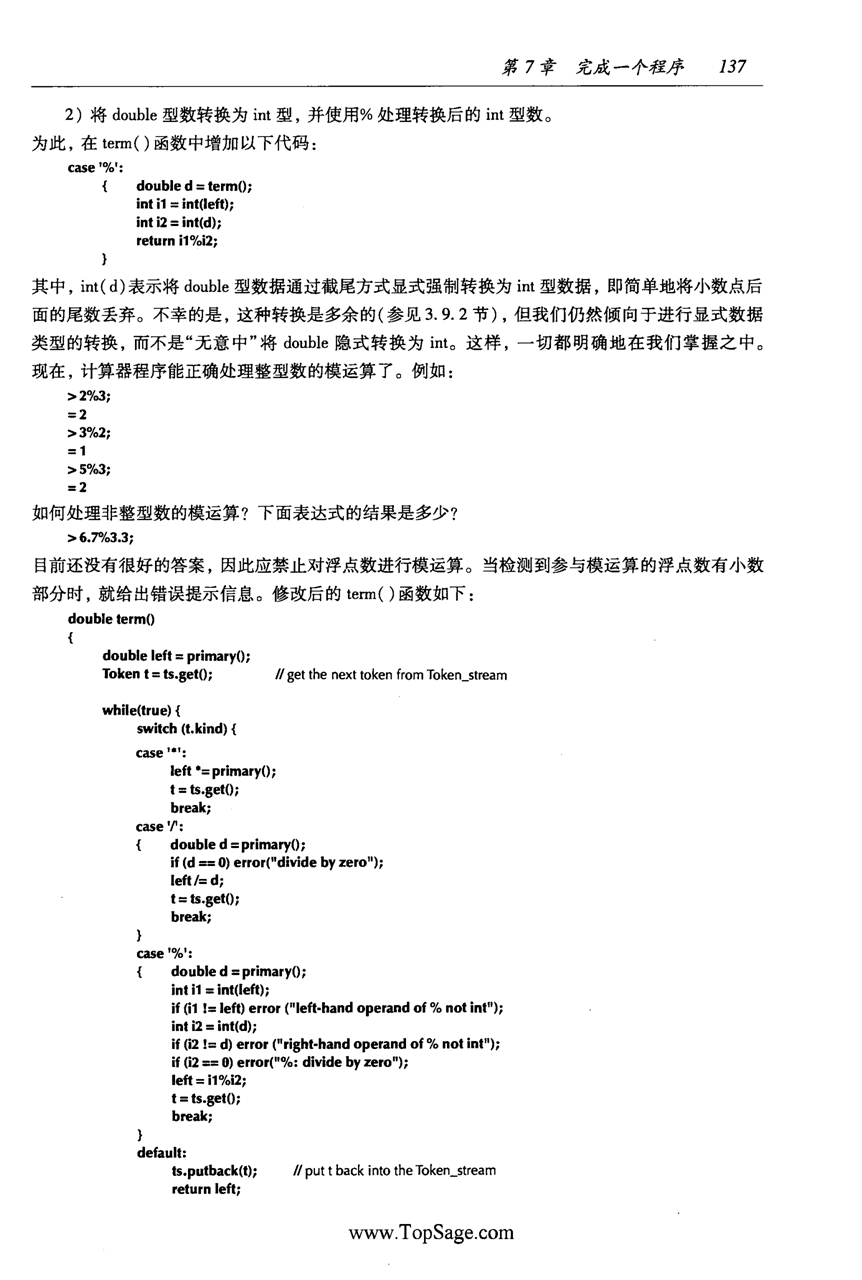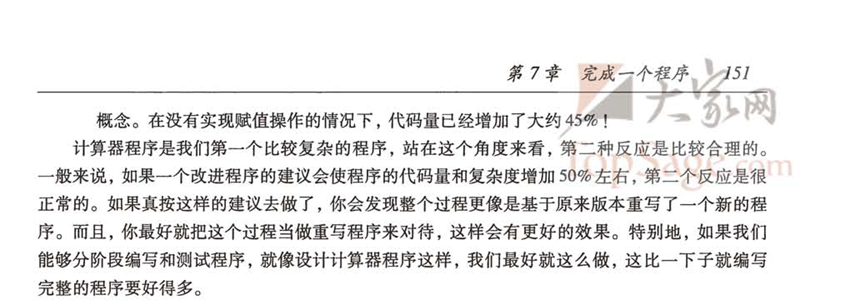读书笔记之:C++程序设计原理与实践(ch06-ch07)[+++]
这儿是本书第6/7章的所有内容,之所以将这两章的内容都添加上来是因为这儿介绍的编写桌面计算器的例子很详细。整个过程非常的好。
1.0 可以完成简单的表达式的计算
 View Code
View Code #include <iostream>
#include <string>
#include <stdexcept>
using std::string;
using std::cout;
using std::cin;
using std::endl;
using std::cerr;
using std::runtime_error;
using std::exception;
inline void error(const string& errormessage)
{
cerr << errormessage << endl;
throw runtime_error(errormessage);
}
inline void error(string s1, string s2)
{
error(s1+s2);
}
class Token {
public:
char kind; // what kind of token
double value; // for numbers: a value
Token(char ch) // make a Token from a char
:kind(ch), value(0) { }
Token(char ch, double val) // make a Token from a char and a double
:kind(ch), value(val) { }
};
class Token_stream {
public:
Token_stream():full(false), buffer(0){} // make a Token_stream that reads from cin
Token get(); // get a Token (get() is defined elsewhere)
void putback(Token t) {
if (full) error("putback() into a full buffer");
buffer = t; // copy t to buffer
full = true; // buffer is now full
}
private:
bool full; // is there a Token in the buffer?
Token buffer; // here is where we keep a Token put back using putback()
};
Token Token_stream::get()
{
if (full) { // do we already have a Token ready?
// remove token from buffer
full=false;
return buffer;
}
char ch;
cin >> ch; // note that >> skips whitespace (space, newline, tab, etc.)
switch (ch) {
case ';': // for "print"
case 'q': // for "quit"
case '(': case ')': case '+': case '-': case '*': case '/':
return Token(ch); // let each character represent itself
case '.':
case '0': case '1': case '2': case '3': case '4':
case '5': case '6': case '7': case '8': case '9':
{
cin.putback(ch); // put digit back into the input stream
double val;
cin >> val; // read a floating-point number
return Token('8',val); // let '8' represent "a number"
}
default:
error("Bad token");
}
}
Token_stream ts; // provides get() and putback()
double expression(); // declaration so that primary() can call expression()
double primary()
{
Token t = ts.get();
switch (t.kind) {
case '(': // handle '(' expression ')'
{
double d = expression();
t = ts.get();
if (t.kind != ')') error("')' expected");
return d;
}
case '8': // we use '8' to represent a number
return t.value; // return the number's value
default:
error("primary expected");
}
}
// deal with *, /, and %
double term()
{
double left = primary();
Token t = ts.get(); // get the next token from token stream
while(true) {
switch (t.kind) {
case '*':
left *= primary();
t = ts.get();
break;
case '/':
{
double d = primary();
if (d == 0) error("divide by zero");
left /= d;
t = ts.get();
break;
}
default:
ts.putback(t); // put t back into the token stream
return left;
}
}
}
// deal with + and -
double expression()
{
double left = term(); // read and evaluate a Term
Token t = ts.get(); // get the next token from token stream
while(true) {
switch(t.kind) {
case '+':
left += term(); // evaluate Term and add
t = ts.get();
break;
case '-':
left -= term(); // evaluate Term and subtract
t = ts.get();
break;
default:
ts.putback(t); // put t back into the token stream
return left; // finally: no more + or -: return the answer
}
}
}
int main()
try
{
double val = 0;
while (cin) {
Token t = ts.get();
if (t.kind == 'q') break; // 'q' for quit
if (t.kind == ';') // ';' for "print now"
cout << "=" << val << '\n';
else
ts.putback(t);
val = expression();
}
}
catch (exception& e) {
cerr << "error: " << e.what() << '\n';
return 1;
}
catch (...) {
cerr << "Oops: unknown exception!\n";
return 2;
}
#include <string>
#include <stdexcept>
using std::string;
using std::cout;
using std::cin;
using std::endl;
using std::cerr;
using std::runtime_error;
using std::exception;
inline void error(const string& errormessage)
{
cerr << errormessage << endl;
throw runtime_error(errormessage);
}
inline void error(string s1, string s2)
{
error(s1+s2);
}
class Token {
public:
char kind; // what kind of token
double value; // for numbers: a value
Token(char ch) // make a Token from a char
:kind(ch), value(0) { }
Token(char ch, double val) // make a Token from a char and a double
:kind(ch), value(val) { }
};
class Token_stream {
public:
Token_stream():full(false), buffer(0){} // make a Token_stream that reads from cin
Token get(); // get a Token (get() is defined elsewhere)
void putback(Token t) {
if (full) error("putback() into a full buffer");
buffer = t; // copy t to buffer
full = true; // buffer is now full
}
private:
bool full; // is there a Token in the buffer?
Token buffer; // here is where we keep a Token put back using putback()
};
Token Token_stream::get()
{
if (full) { // do we already have a Token ready?
// remove token from buffer
full=false;
return buffer;
}
char ch;
cin >> ch; // note that >> skips whitespace (space, newline, tab, etc.)
switch (ch) {
case ';': // for "print"
case 'q': // for "quit"
case '(': case ')': case '+': case '-': case '*': case '/':
return Token(ch); // let each character represent itself
case '.':
case '0': case '1': case '2': case '3': case '4':
case '5': case '6': case '7': case '8': case '9':
{
cin.putback(ch); // put digit back into the input stream
double val;
cin >> val; // read a floating-point number
return Token('8',val); // let '8' represent "a number"
}
default:
error("Bad token");
}
}
Token_stream ts; // provides get() and putback()
double expression(); // declaration so that primary() can call expression()
double primary()
{
Token t = ts.get();
switch (t.kind) {
case '(': // handle '(' expression ')'
{
double d = expression();
t = ts.get();
if (t.kind != ')') error("')' expected");
return d;
}
case '8': // we use '8' to represent a number
return t.value; // return the number's value
default:
error("primary expected");
}
}
// deal with *, /, and %
double term()
{
double left = primary();
Token t = ts.get(); // get the next token from token stream
while(true) {
switch (t.kind) {
case '*':
left *= primary();
t = ts.get();
break;
case '/':
{
double d = primary();
if (d == 0) error("divide by zero");
left /= d;
t = ts.get();
break;
}
default:
ts.putback(t); // put t back into the token stream
return left;
}
}
}
// deal with + and -
double expression()
{
double left = term(); // read and evaluate a Term
Token t = ts.get(); // get the next token from token stream
while(true) {
switch(t.kind) {
case '+':
left += term(); // evaluate Term and add
t = ts.get();
break;
case '-':
left -= term(); // evaluate Term and subtract
t = ts.get();
break;
default:
ts.putback(t); // put t back into the token stream
return left; // finally: no more + or -: return the answer
}
}
}
int main()
try
{
double val = 0;
while (cin) {
Token t = ts.get();
if (t.kind == 'q') break; // 'q' for quit
if (t.kind == ';') // ';' for "print now"
cout << "=" << val << '\n';
else
ts.putback(t);
val = expression();
}
}
catch (exception& e) {
cerr << "error: " << e.what() << '\n';
return 1;
}
catch (...) {
cerr << "Oops: unknown exception!\n";
return 2;
}
1.1比较人性化的输入输出,可以处理负数,可以进行模运算,可以错误恢复,
 View Code
View Code //
// This is example code from Chapter 7.7 "Recovering from errors" of
// "Programming -- Principles and Practice Using C++" by Bjarne Stroustrup
//
#include "std_lib_facilities.h"
/*
Simple calculator
Revision history:
Revised by Bjarne Stroustrup May 2007
Revised by Bjarne Stroustrup August 2006
Revised by Bjarne Stroustrup August 2004
Originally written by Bjarne Stroustrup
(bs@cs.tamu.edu) Spring 2004.
This program implements a basic expression calculator.
Input from cin; output to cout.
The grammar for input is:
Statement:
Expression
Print
Quit
Print:
;
Quit:
q
Expression:
Term
Expression + Term
Expression - Term
Term:
Primary
Term * Primary
Term / Primary
Term % Primary
Primary:
Number
( Expression )
- Primary
+ Primary
Number:
floating-point-literal
Input comes from cin through the Token_stream called ts.
*/
//------------------------------------------------------------------------------
const char number = '8'; // t.kind==number means that t is a number Token
const char quit = 'q'; // t.kind==quit means that t is a quit Token
const char print = ';'; // t.kind==print means that t is a print Token
const string prompt = "> ";
const string result = "= "; // used to indicate that what follows is a result
//------------------------------------------------------------------------------
class Token {
public:
char kind; // what kind of token
double value; // for numbers: a value
Token(char ch) // make a Token from a char
:kind(ch), value(0) { }
Token(char ch, double val) // make a Token from a char and a double
:kind(ch), value(val) { }
};
//------------------------------------------------------------------------------
class Token_stream {
public:
Token_stream(); // make a Token_stream that reads from cin
Token get(); // get a Token (get() is defined elsewhere)
void putback(Token t); // put a Token back
private:
bool full; // is there a Token in the buffer?
Token buffer; // here is where we keep a Token put back using putback()
};
//------------------------------------------------------------------------------
// The constructor just sets full to indicate that the buffer is empty:
Token_stream::Token_stream()
:full(false), buffer(0) // no Token in buffer
{
}
//------------------------------------------------------------------------------
// The putback() member function puts its argument back into the Token_stream's buffer:
void Token_stream::putback(Token t)
{
if (full) error("putback() into a full buffer");
buffer = t; // copy t to buffer
full = true; // buffer is now full
}
//------------------------------------------------------------------------------
Token Token_stream::get() // read characters from cin and compose a Token
{
if (full) { // check if we already have a Token ready
full=false;
return buffer;
}
char ch;
cin >> ch; // note that >> skips whitespace (space, newline, tab, etc.)
switch (ch) {
case quit:
case print:
case '(':
case ')':
case '+':
case '-':
case '*':
case '/':
case '%':
return Token(ch); // let each character represent itself
case '.': // a floating-point literal can start with a dot
case '0': case '1': case '2': case '3': case '4':
case '5': case '6': case '7': case '8': case '9': // numeric literal
{
cin.putback(ch);// put digit back into the input stream
double val;
cin >> val; // read a floating-point number
return Token(number,val);
}
default:
error("Bad token");
}
}
//------------------------------------------------------------------------------
Token_stream ts; // provides get() and putback()
//------------------------------------------------------------------------------
double expression(); // declaration so that primary() can call expression()
//------------------------------------------------------------------------------
// deal with numbers and parentheses
double primary()
{
Token t = ts.get();
switch (t.kind) {
case '(': // handle '(' expression ')'
{
double d = expression();
t = ts.get();
if (t.kind != ')') error("')' expected");
return d;
}
case number:
return t.value; // return the number's value
case '-':
return - primary();
case '+':
return primary();
default:
error("primary expected");
}
}
//------------------------------------------------------------------------------
// deal with *, /, and %
double term()
{
double left = primary();
Token t = ts.get(); // get the next token from token stream
while(true) {
switch (t.kind) {
case '*':
left *= primary();
t = ts.get();
break;
case '/':
{
double d = primary();
if (d == 0) error("divide by zero");
left /= d;
t = ts.get();
break;
}
case '%':
{
int i1 = narrow_cast<int>(left);
int i2 = narrow_cast<int>(term());
if (i2 == 0) error("%: divide by zero");
left = i1%i2;
t = ts.get();
break;
}
default:
ts.putback(t); // put t back into the token stream
return left;
}
}
}
//------------------------------------------------------------------------------
// deal with + and -
double expression()
{
double left = term(); // read and evaluate a Term
Token t = ts.get(); // get the next token from token stream
while(true) {
switch(t.kind) {
case '+':
left += term(); // evaluate Term and add
t = ts.get();
break;
case '-':
left -= term(); // evaluate Term and subtract
t = ts.get();
break;
default:
ts.putback(t); // put t back into the token stream
return left; // finally: no more + or -: return the answer
}
}
}
//------------------------------------------------------------------------------
void clean_up_mess() // naive
{
while (true) { // skip until we find a print
Token t = ts.get();
if (t.kind == print) return;
}
}
//------------------------------------------------------------------------------
void calculate()
{
while (cin)
try {
cout << prompt;
Token t = ts.get();
while (t.kind == print) t=ts.get(); // first discard all "prints"
if (t.kind == quit) return; // quit
ts.putback(t);
cout << result << expression() << endl;
}
catch (exception& e) {
cerr << e.what() << endl; // write error message
clean_up_mess();
}
}
//------------------------------------------------------------------------------
int main()
try {
calculate();
keep_window_open(); // cope with Windows console mode
return 0;
}
catch (runtime_error& e) {
cerr << e.what() << endl;
keep_window_open("~~");
return 1;
}
catch (...) {
cerr << "exception \n";
keep_window_open("~~");
return 2;
}
//------------------------------------------------------------------------------
// This is example code from Chapter 7.7 "Recovering from errors" of
// "Programming -- Principles and Practice Using C++" by Bjarne Stroustrup
//
#include "std_lib_facilities.h"
/*
Simple calculator
Revision history:
Revised by Bjarne Stroustrup May 2007
Revised by Bjarne Stroustrup August 2006
Revised by Bjarne Stroustrup August 2004
Originally written by Bjarne Stroustrup
(bs@cs.tamu.edu) Spring 2004.
This program implements a basic expression calculator.
Input from cin; output to cout.
The grammar for input is:
Statement:
Expression
Quit
Print:
;
Quit:
q
Expression:
Term
Expression + Term
Expression - Term
Term:
Primary
Term * Primary
Term / Primary
Term % Primary
Primary:
Number
( Expression )
- Primary
+ Primary
Number:
floating-point-literal
Input comes from cin through the Token_stream called ts.
*/
//------------------------------------------------------------------------------
const char number = '8'; // t.kind==number means that t is a number Token
const char quit = 'q'; // t.kind==quit means that t is a quit Token
const char print = ';'; // t.kind==print means that t is a print Token
const string prompt = "> ";
const string result = "= "; // used to indicate that what follows is a result
//------------------------------------------------------------------------------
class Token {
public:
char kind; // what kind of token
double value; // for numbers: a value
Token(char ch) // make a Token from a char
:kind(ch), value(0) { }
Token(char ch, double val) // make a Token from a char and a double
:kind(ch), value(val) { }
};
//------------------------------------------------------------------------------
class Token_stream {
public:
Token_stream(); // make a Token_stream that reads from cin
Token get(); // get a Token (get() is defined elsewhere)
void putback(Token t); // put a Token back
private:
bool full; // is there a Token in the buffer?
Token buffer; // here is where we keep a Token put back using putback()
};
//------------------------------------------------------------------------------
// The constructor just sets full to indicate that the buffer is empty:
Token_stream::Token_stream()
:full(false), buffer(0) // no Token in buffer
{
}
//------------------------------------------------------------------------------
// The putback() member function puts its argument back into the Token_stream's buffer:
void Token_stream::putback(Token t)
{
if (full) error("putback() into a full buffer");
buffer = t; // copy t to buffer
full = true; // buffer is now full
}
//------------------------------------------------------------------------------
Token Token_stream::get() // read characters from cin and compose a Token
{
if (full) { // check if we already have a Token ready
full=false;
return buffer;
}
char ch;
cin >> ch; // note that >> skips whitespace (space, newline, tab, etc.)
switch (ch) {
case quit:
case print:
case '(':
case ')':
case '+':
case '-':
case '*':
case '/':
case '%':
return Token(ch); // let each character represent itself
case '.': // a floating-point literal can start with a dot
case '0': case '1': case '2': case '3': case '4':
case '5': case '6': case '7': case '8': case '9': // numeric literal
{
cin.putback(ch);// put digit back into the input stream
double val;
cin >> val; // read a floating-point number
return Token(number,val);
}
default:
error("Bad token");
}
}
//------------------------------------------------------------------------------
Token_stream ts; // provides get() and putback()
//------------------------------------------------------------------------------
double expression(); // declaration so that primary() can call expression()
//------------------------------------------------------------------------------
// deal with numbers and parentheses
double primary()
{
Token t = ts.get();
switch (t.kind) {
case '(': // handle '(' expression ')'
{
double d = expression();
t = ts.get();
if (t.kind != ')') error("')' expected");
return d;
}
case number:
return t.value; // return the number's value
case '-':
return - primary();
case '+':
return primary();
default:
error("primary expected");
}
}
//------------------------------------------------------------------------------
// deal with *, /, and %
double term()
{
double left = primary();
Token t = ts.get(); // get the next token from token stream
while(true) {
switch (t.kind) {
case '*':
left *= primary();
t = ts.get();
break;
case '/':
{
double d = primary();
if (d == 0) error("divide by zero");
left /= d;
t = ts.get();
break;
}
case '%':
{
int i1 = narrow_cast<int>(left);
int i2 = narrow_cast<int>(term());
if (i2 == 0) error("%: divide by zero");
left = i1%i2;
t = ts.get();
break;
}
default:
ts.putback(t); // put t back into the token stream
return left;
}
}
}
//------------------------------------------------------------------------------
// deal with + and -
double expression()
{
double left = term(); // read and evaluate a Term
Token t = ts.get(); // get the next token from token stream
while(true) {
switch(t.kind) {
case '+':
left += term(); // evaluate Term and add
t = ts.get();
break;
case '-':
left -= term(); // evaluate Term and subtract
t = ts.get();
break;
default:
ts.putback(t); // put t back into the token stream
return left; // finally: no more + or -: return the answer
}
}
}
//------------------------------------------------------------------------------
void clean_up_mess() // naive
{
while (true) { // skip until we find a print
Token t = ts.get();
if (t.kind == print) return;
}
}
//------------------------------------------------------------------------------
void calculate()
{
while (cin)
try {
cout << prompt;
Token t = ts.get();
while (t.kind == print) t=ts.get(); // first discard all "prints"
if (t.kind == quit) return; // quit
ts.putback(t);
cout << result << expression() << endl;
}
catch (exception& e) {
cerr << e.what() << endl; // write error message
clean_up_mess();
}
}
//------------------------------------------------------------------------------
int main()
try {
calculate();
keep_window_open(); // cope with Windows console mode
return 0;
}
catch (runtime_error& e) {
cerr << e.what() << endl;
keep_window_open("~~");
return 1;
}
catch (...) {
cerr << "exception \n";
keep_window_open("~~");
return 2;
}
//------------------------------------------------------------------------------
1.2 可以处理变量
 View Code
View Code //
// This is example code from Chapter 7.8.3 "Predefined names" of
// "Programming -- Principles and Practice Using C++" by Bjarne Stroustrup
//
#include "std_lib_facilities.h"
/*
Simple calculator
Revision history:
Revised by Bjarne Stroustrup May 2007
Revised by Bjarne Stroustrup August 2006
Revised by Bjarne Stroustrup August 2004
Originally written by Bjarne Stroustrup
(bs@cs.tamu.edu) Spring 2004.
This program implements a basic expression calculator.
Input from cin; output to cout.
The grammar for input is:
Calculation:
Statement
Print
Quit
Calculation Statement
Statement:
Declaration
Expression
Declaration:
"let" Name "=" Expression
Print:
;
Quit:
q
Expression:
Term
Expression + Term
Expression - Term
Term:
Primary
Term * Primary
Term / Primary
Term % Primary
Primary:
Number
Name
( Expression )
- Primary
+ Primary
Number:
floating-point-literal
Input comes from cin through the Token_stream called ts.
Input test:
let x = 3.4;
let y = 2;
let z = (x+y*2)/pi;
let z1 = -y*2+z*pi;
q
*/
//------------------------------------------------------------------------------
const char number = '8'; // t.kind==number means that t is a number Token
const char quit = 'q'; // t.kind==quit means that t is a quit Token
const char print = ';'; // t.kind==print means that t is a print Token
const char name = 'a'; // name token
const char let = 'L'; // declaration token
const string declkey = "let";// declaration keyword
const string prompt = "> ";
const string result = "= "; // used to indicate that what follows is a result
//------------------------------------------------------------------------------
class Token {
public:
char kind; // what kind of token
double value; // for numbers: a value
string name; // for names: name itself
Token(char ch) : kind(ch), value(0) {}
Token(char ch, double val) : kind(ch), value(val) {}
Token(char ch, string n) : kind(ch), name(n) {}
};
//------------------------------------------------------------------------------
class Token_stream {
public:
Token_stream(); // make a Token_stream that reads from cin
Token get(); // get a Token (get() is defined elsewhere)
void putback(Token t); // put a Token back
void ignore(char c); // discard tokens up to an including a c
private:
bool full; // is there a Token in the buffer?
Token buffer; // here is where we keep a Token put back using putback()
};
//------------------------------------------------------------------------------
// The constructor just sets full to indicate that the buffer is empty:
Token_stream::Token_stream()
:full(false), buffer(0) // no Token in buffer
{
}
//------------------------------------------------------------------------------
// The putback() member function puts its argument back into the Token_stream's buffer:
void Token_stream::putback(Token t)
{
if (full) error("putback() into a full buffer");
buffer = t; // copy t to buffer
full = true; // buffer is now full
}
//------------------------------------------------------------------------------
Token Token_stream::get() // read characters from cin and compose a Token
{
if (full) { // check if we already have a Token ready
full=false;
return buffer;
}
char ch;
cin >> ch; // note that >> skips whitespace (space, newline, tab, etc.)
switch (ch) {
case quit:
case print:
case '(':
case ')':
case '+':
case '-':
case '*':
case '/':
case '%':
case '=':
return Token(ch); // let each character represent itself
case '.': // a floating-point literal can start with a dot
case '0': case '1': case '2': case '3': case '4':
case '5': case '6': case '7': case '8': case '9': // numeric literal
{
cin.putback(ch);// put digit back into the input stream
double val;
cin >> val; // read a floating-point number
return Token(number,val);
}
default:
if (isalpha(ch)) {
string s;
s += ch;
while (cin.get(ch) && (isalpha(ch) || isdigit(ch))) s+=ch;
cin.putback(ch);
if (s == declkey) return Token(let); // keyword "let"
return Token(name,s);
}
error("Bad token");
}
}
//------------------------------------------------------------------------------
void Token_stream::ignore(char c)
// c represents the kind of a Token
{
// first look in buffer:
if (full && c==buffer.kind) {
full = false;
return;
}
full = false;
// now search input:
char ch = 0;
while (cin>>ch)
if (ch==c) return;
}
//------------------------------------------------------------------------------
Token_stream ts; // provides get() and putback()
//------------------------------------------------------------------------------
class Variable {
public:
string name;
double value;
Variable (string n, double v) :name(n), value(v) { }
};
//------------------------------------------------------------------------------
vector<Variable> var_table;
//------------------------------------------------------------------------------
double get_value(string s)
// return the value of the Variable names s
{
for (int i = 0; i<var_table.size(); ++i)
if (var_table[i].name == s) return var_table[i].value;
error("get: undefined variable ", s);
}
//------------------------------------------------------------------------------
void set_value(string s, double d)
// set the Variable named s to d
{
for (int i = 0; i<var_table.size(); ++i)
if (var_table[i].name == s) {
var_table[i].value = d;
return;
}
error("set: undefined variable ", s);
}
//------------------------------------------------------------------------------
bool is_declared(string var)
// is var already in var_table?
{
for (int i = 0; i<var_table.size(); ++i)
if (var_table[i].name == var) return true;
return false;
}
//------------------------------------------------------------------------------
double define_name(string var, double val)
// add (var,val) to var_table
{
if (is_declared(var)) error(var," declared twice");
var_table.push_back(Variable(var,val));
return val;
}
//------------------------------------------------------------------------------
double expression(); // declaration so that primary() can call expression()
//------------------------------------------------------------------------------
// deal with numbers and parentheses
double primary()
{
Token t = ts.get();
switch (t.kind) {
case '(': // handle '(' expression ')'
{
double d = expression();
t = ts.get();
if (t.kind != ')') error("')' expected");
return d;
}
case number:
return t.value; // return the number's value
case name:
return get_value(t.name); // return the variable's value
case '-':
return - primary();
case '+':
return primary();
default:
error("primary expected");
}
}
//------------------------------------------------------------------------------
// deal with *, /, and %
double term()
{
double left = primary();
Token t = ts.get(); // get the next token from token stream
while(true) {
switch (t.kind) {
case '*':
left *= primary();
t = ts.get();
break;
case '/':
{
double d = primary();
if (d == 0) error("divide by zero");
left /= d;
t = ts.get();
break;
}
case '%':
{
int i1 = narrow_cast<int>(left);
int i2 = narrow_cast<int>(term());
if (i2 == 0) error("%: divide by zero");
left = i1%i2;
t = ts.get();
break;
}
default:
ts.putback(t); // put t back into the token stream
return left;
}
}
}
//------------------------------------------------------------------------------
// deal with + and -
double expression()
{
double left = term(); // read and evaluate a Term
Token t = ts.get(); // get the next token from token stream
while(true) {
switch(t.kind) {
case '+':
left += term(); // evaluate Term and add
t = ts.get();
break;
case '-':
left -= term(); // evaluate Term and subtract
t = ts.get();
break;
default:
ts.putback(t); // put t back into the token stream
return left; // finally: no more + or -: return the answer
}
}
}
//------------------------------------------------------------------------------
double declaration()
// handle: name = expression
// declare a variable called "name" with the initial value "expression"
{
Token t = ts.get();
if (t.kind != name) error ("name expected in declaration");
string var_name = t.name;
Token t2 = ts.get();
if (t2.kind != '=') error("= missing in declaration of ", var_name);
double d = expression();
define_name(var_name,d);
return d;
}
//------------------------------------------------------------------------------
double statement()
{
Token t = ts.get();
switch (t.kind) {
case let:
return declaration();
default:
ts.putback(t);
return expression();
}
}
//------------------------------------------------------------------------------
void clean_up_mess()
{
ts.ignore(print);
}
//------------------------------------------------------------------------------
void calculate()
{
while (cin)
try {
cout << prompt;
Token t = ts.get();
while (t.kind == print) t=ts.get(); // first discard all "prints"
if (t.kind == quit) return; // quit
ts.putback(t);
cout << result << statement() << endl;
}
catch (exception& e) {
cerr << e.what() << endl; // write error message
clean_up_mess();
}
}
//------------------------------------------------------------------------------
int main()
try {
// predefine names:
define_name("pi",3.1415926535);
define_name("e",2.7182818284);
calculate();
keep_window_open(); // cope with Windows console mode
return 0;
}
catch (exception& e) {
cerr << e.what() << endl;
keep_window_open("~~");
return 1;
}
catch (...) {
cerr << "exception \n";
keep_window_open("~~");
return 2;
}
//------------------------------------------------------------------------------
// This is example code from Chapter 7.8.3 "Predefined names" of
// "Programming -- Principles and Practice Using C++" by Bjarne Stroustrup
//
#include "std_lib_facilities.h"
/*
Simple calculator
Revision history:
Revised by Bjarne Stroustrup May 2007
Revised by Bjarne Stroustrup August 2006
Revised by Bjarne Stroustrup August 2004
Originally written by Bjarne Stroustrup
(bs@cs.tamu.edu) Spring 2004.
This program implements a basic expression calculator.
Input from cin; output to cout.
The grammar for input is:
Calculation:
Statement
Quit
Calculation Statement
Statement:
Declaration
Expression
Declaration:
"let" Name "=" Expression
Print:
;
Quit:
q
Expression:
Term
Expression + Term
Expression - Term
Term:
Primary
Term * Primary
Term / Primary
Term % Primary
Primary:
Number
Name
( Expression )
- Primary
+ Primary
Number:
floating-point-literal
Input comes from cin through the Token_stream called ts.
Input test:
let x = 3.4;
let y = 2;
let z = (x+y*2)/pi;
let z1 = -y*2+z*pi;
q
*/
//------------------------------------------------------------------------------
const char number = '8'; // t.kind==number means that t is a number Token
const char quit = 'q'; // t.kind==quit means that t is a quit Token
const char print = ';'; // t.kind==print means that t is a print Token
const char name = 'a'; // name token
const char let = 'L'; // declaration token
const string declkey = "let";// declaration keyword
const string prompt = "> ";
const string result = "= "; // used to indicate that what follows is a result
//------------------------------------------------------------------------------
class Token {
public:
char kind; // what kind of token
double value; // for numbers: a value
string name; // for names: name itself
Token(char ch) : kind(ch), value(0) {}
Token(char ch, double val) : kind(ch), value(val) {}
Token(char ch, string n) : kind(ch), name(n) {}
};
//------------------------------------------------------------------------------
class Token_stream {
public:
Token_stream(); // make a Token_stream that reads from cin
Token get(); // get a Token (get() is defined elsewhere)
void putback(Token t); // put a Token back
void ignore(char c); // discard tokens up to an including a c
private:
bool full; // is there a Token in the buffer?
Token buffer; // here is where we keep a Token put back using putback()
};
//------------------------------------------------------------------------------
// The constructor just sets full to indicate that the buffer is empty:
Token_stream::Token_stream()
:full(false), buffer(0) // no Token in buffer
{
}
//------------------------------------------------------------------------------
// The putback() member function puts its argument back into the Token_stream's buffer:
void Token_stream::putback(Token t)
{
if (full) error("putback() into a full buffer");
buffer = t; // copy t to buffer
full = true; // buffer is now full
}
//------------------------------------------------------------------------------
Token Token_stream::get() // read characters from cin and compose a Token
{
if (full) { // check if we already have a Token ready
full=false;
return buffer;
}
char ch;
cin >> ch; // note that >> skips whitespace (space, newline, tab, etc.)
switch (ch) {
case quit:
case print:
case '(':
case ')':
case '+':
case '-':
case '*':
case '/':
case '%':
case '=':
return Token(ch); // let each character represent itself
case '.': // a floating-point literal can start with a dot
case '0': case '1': case '2': case '3': case '4':
case '5': case '6': case '7': case '8': case '9': // numeric literal
{
cin.putback(ch);// put digit back into the input stream
double val;
cin >> val; // read a floating-point number
return Token(number,val);
}
default:
if (isalpha(ch)) {
string s;
s += ch;
while (cin.get(ch) && (isalpha(ch) || isdigit(ch))) s+=ch;
cin.putback(ch);
if (s == declkey) return Token(let); // keyword "let"
return Token(name,s);
}
error("Bad token");
}
}
//------------------------------------------------------------------------------
void Token_stream::ignore(char c)
// c represents the kind of a Token
{
// first look in buffer:
if (full && c==buffer.kind) {
full = false;
return;
}
full = false;
// now search input:
char ch = 0;
while (cin>>ch)
if (ch==c) return;
}
//------------------------------------------------------------------------------
Token_stream ts; // provides get() and putback()
//------------------------------------------------------------------------------
class Variable {
public:
string name;
double value;
Variable (string n, double v) :name(n), value(v) { }
};
//------------------------------------------------------------------------------
vector<Variable> var_table;
//------------------------------------------------------------------------------
double get_value(string s)
// return the value of the Variable names s
{
for (int i = 0; i<var_table.size(); ++i)
if (var_table[i].name == s) return var_table[i].value;
error("get: undefined variable ", s);
}
//------------------------------------------------------------------------------
void set_value(string s, double d)
// set the Variable named s to d
{
for (int i = 0; i<var_table.size(); ++i)
if (var_table[i].name == s) {
var_table[i].value = d;
return;
}
error("set: undefined variable ", s);
}
//------------------------------------------------------------------------------
bool is_declared(string var)
// is var already in var_table?
{
for (int i = 0; i<var_table.size(); ++i)
if (var_table[i].name == var) return true;
return false;
}
//------------------------------------------------------------------------------
double define_name(string var, double val)
// add (var,val) to var_table
{
if (is_declared(var)) error(var," declared twice");
var_table.push_back(Variable(var,val));
return val;
}
//------------------------------------------------------------------------------
double expression(); // declaration so that primary() can call expression()
//------------------------------------------------------------------------------
// deal with numbers and parentheses
double primary()
{
Token t = ts.get();
switch (t.kind) {
case '(': // handle '(' expression ')'
{
double d = expression();
t = ts.get();
if (t.kind != ')') error("')' expected");
return d;
}
case number:
return t.value; // return the number's value
case name:
return get_value(t.name); // return the variable's value
case '-':
return - primary();
case '+':
return primary();
default:
error("primary expected");
}
}
//------------------------------------------------------------------------------
// deal with *, /, and %
double term()
{
double left = primary();
Token t = ts.get(); // get the next token from token stream
while(true) {
switch (t.kind) {
case '*':
left *= primary();
t = ts.get();
break;
case '/':
{
double d = primary();
if (d == 0) error("divide by zero");
left /= d;
t = ts.get();
break;
}
case '%':
{
int i1 = narrow_cast<int>(left);
int i2 = narrow_cast<int>(term());
if (i2 == 0) error("%: divide by zero");
left = i1%i2;
t = ts.get();
break;
}
default:
ts.putback(t); // put t back into the token stream
return left;
}
}
}
//------------------------------------------------------------------------------
// deal with + and -
double expression()
{
double left = term(); // read and evaluate a Term
Token t = ts.get(); // get the next token from token stream
while(true) {
switch(t.kind) {
case '+':
left += term(); // evaluate Term and add
t = ts.get();
break;
case '-':
left -= term(); // evaluate Term and subtract
t = ts.get();
break;
default:
ts.putback(t); // put t back into the token stream
return left; // finally: no more + or -: return the answer
}
}
}
//------------------------------------------------------------------------------
double declaration()
// handle: name = expression
// declare a variable called "name" with the initial value "expression"
{
Token t = ts.get();
if (t.kind != name) error ("name expected in declaration");
string var_name = t.name;
Token t2 = ts.get();
if (t2.kind != '=') error("= missing in declaration of ", var_name);
double d = expression();
define_name(var_name,d);
return d;
}
//------------------------------------------------------------------------------
double statement()
{
Token t = ts.get();
switch (t.kind) {
case let:
return declaration();
default:
ts.putback(t);
return expression();
}
}
//------------------------------------------------------------------------------
void clean_up_mess()
{
ts.ignore(print);
}
//------------------------------------------------------------------------------
void calculate()
{
while (cin)
try {
cout << prompt;
Token t = ts.get();
while (t.kind == print) t=ts.get(); // first discard all "prints"
if (t.kind == quit) return; // quit
ts.putback(t);
cout << result << statement() << endl;
}
catch (exception& e) {
cerr << e.what() << endl; // write error message
clean_up_mess();
}
}
//------------------------------------------------------------------------------
int main()
try {
// predefine names:
define_name("pi",3.1415926535);
define_name("e",2.7182818284);
calculate();
keep_window_open(); // cope with Windows console mode
return 0;
}
catch (exception& e) {
cerr << e.what() << endl;
keep_window_open("~~");
return 1;
}
catch (...) {
cerr << "exception \n";
keep_window_open("~~");
return 2;
}
//------------------------------------------------------------------------------
